#HOW do i tag this for ships who knows
Explore tagged Tumblr posts
Text
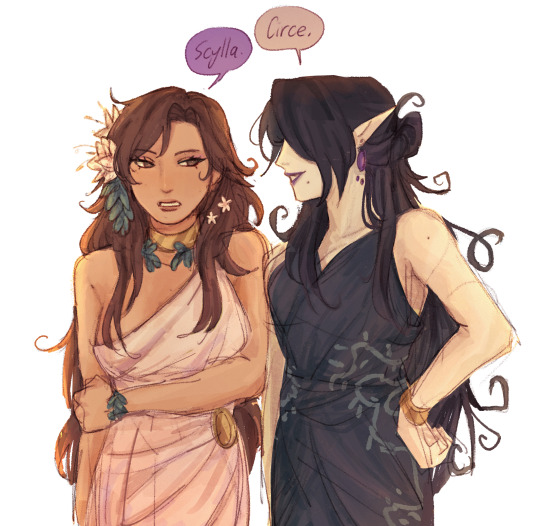
legend has it that the young witch circe and the once beautiful nymph scylla shared a complicated past...
#art#cirscylla#that's the ship name i like for them best anyway#circe#scylla#greek mythology#welcome to my greek mythos yuri#DOOMED YURI#circylla#epic the musical#do i even tag it as that? i think i should cuz epic is the reason im so into greek mythos#jorge said we might get a spinoff about their backstory and im insane over that#i know it's probably going to be about how circe loved that one guy but still a girl can dream#this is them but younger! before circe turns scylla into the horrific man-eating monster that even poseiden fears#there's just so much potential here#consider a younger and much warier circe landing on the island for the first time after being outcasted by her family for her magic#and she meets scylla there who back then is a much happier and playful person#enemies to lovers to enemies again#i don't know if they ever make it to lovers or if they were only an almost#they're about to have the worst breakup in greek history#im rambling in tags MY BAD
3K notes
·
View notes
Text



Sobriety crew gets no mercy from drunk shenanigans
#an art#sdr2#super danganronpa 2#Danganronpa the#danganronpa#fuyuhiko kuzuryu#akane owari#nekomaru nidai#Aoi asahina#chihiro fujisaki#mikan tsumiki#Idk I guess I wanted to draw characters being physical. And drunk#And just have fun colouring#Nidai doesn't drink but loves parties anyway and takes the ppl who go overboard home#And then wakes them up at 8 the next day to get some NUTRITION AND ELECTROLYTES AND TO SWEAT OUT THE BOOZE#Akane only drinks super occasionally (fx when it's free or really elaborate like giant fruit cocktails) or when someone challenges her#But she always comes pick up her drunk friends (lightweight Aoi hehe). Starts a fight occasionally....#Girls are allowed to crash at her place anytime. But she wakes up at 5 and you will wake up too#Fuyuhiko doesn't drink but has to do a lot of businesses at bars which he sometimes owns some part in#So he's in the party scene a lot anyway. He takes security seriously and would rather call you a cab than let you leave on stumbly legs#Mikan doesn't know how to say no and gets swept up in drunk people being...not mean to her#Chihiro does not drink often (because it usually ends like this)#Aoi is just a lightweight and gets sick easily#I really wanted to draw Chihiro with a 70s blowout cut but I think it didn't come through lol#Not tagging ships you can make your own meaning I'm tired and I gotta wrap presents. Which i hate doing wish me well
655 notes
·
View notes
Text

you dream of devouring your friends whole
#the 'it' and 'that' sif is referring to is the act 3 loop hangout but i enjoy being vague in dialogue it feels natural. tee hee.#serious time means everyone gets noses btw. sorry about the slow metamorphasis back into my usual style from my mimicry#in stars and time#isat#isat spoilers#isat loop#isat act 5 spoilers#isat act 6 spoilers#isat siffrin#in stars and time fanart#isat fanart#sifloop#YES IM TAGGING THE SHIP. THUMBS UP. READ INTO THAT HOW YOU WILL BECAUSE IT WAS ON MY MIND WHEN DRAWING IT AT THE LEAST#aaaaaanyway. my personal reading of loop is. how do you say... flowey-esque. to invoke a fellow antagonistic timelooper. since imo#they do seem even fuuurther gone than sasasap sif was when we saw them. and BOY DOES LATEGAME ISAT SIF HAVE SOME INTRUSTIVE THOUGHTS#so uh. who's to say what happened in there. since we know start again isnt quite congruent as loop never beat the king.#i wouldn't blame them for going maybe a little mad. just a lil#it is important to me that loop is. perhaps a bit haunted. AND THAT THEY GET THROUGH IT!!! but they are haunted#lucabyteart#anyway uhhh. probably should put a cw for implied cannibalism??#cannibalism mention
2K notes
·
View notes
Text






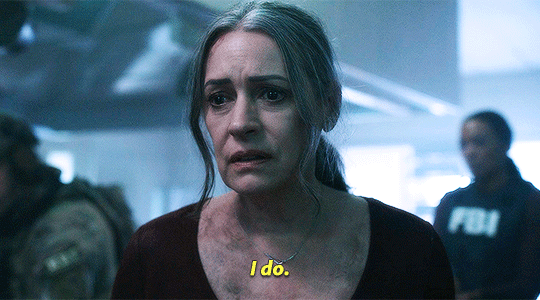
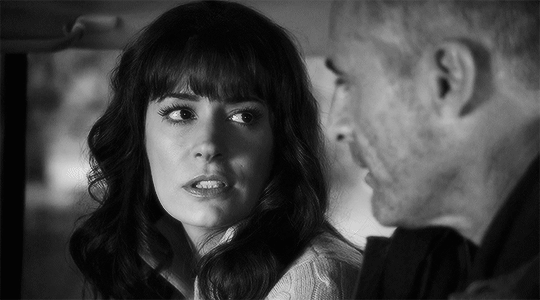





#criminal minds#criminalmindsedit#criminalmindsverse#proceduraledit#emily prentiss#emilyprentissedit#cmverse#cmverseedit#criminal minds evolution#cmevolutionedit#tvedit#filmtvcentral#dailyflicks#ladiesblr#femalecharacters#bitchys#mine#edit#*#internal*#evidence*#p r o o f#i have been struggling for AGES with how i wanted to do a set pairing the lauren arc and the 'play along' scene#and then cme just gifted me this perfect container scene *chef's kiss* i know there's hella nuance that needs to be read into this set#(like the warehouse scene is really just representative of her mindset undercover) but i think you guys Get It#otp: you are who you pretend to be#(feels so ... to use that tag on this set specifically but it's also exactly how i ship them - as emily's coping mechanism - so!!!)#someday i will let go of the lauren arc. someday. (no i won't.)#criminal minds evolution spoilers#(tag issue resolved!! sorry for the duplicate set guys you'll never guess what the issue word was)
472 notes
·
View notes
Note
You ever just see a Mouthwashing take that makes you want to bang your head into a wall? I literally just saw someone claim Curly couldn't have been emotionally abused by Jimmy before the crash because he was in a higher position of power than Jimmy.
-Shrimp Anon
The mouthwashing fandom has shown me that people genuinely do believe that certain types of abuse are not as detrimental as other types especially when they deem those immune/resistant, ergo, believing one is objectively worse no matter how it affects the person nor the intersections of power, history and dynamics at play.
Get ready cause this is a yap session:
Cause like it's heavily implied that Curly and Jimmy's friendship was toxic and abusive, pointedly in the direction of how Jimmy uses Curly's belief/comfort in him. Curly wasn't forced to enable Jimmy but he was emotional and mentally on edge around him in almost every scene in some way. Mental and emotional abuse are not contingent on what positions you have at work. Yeah, he's Jimmy's boss but he was Jimmy's friend first and it's like getting into Psych discussion to talk about how social power tends to overshadow any perceived organizational power in the human mind. People are concerned about their jobs ofc but they tend to hang onto and put more value/investment into their personal relationships, hence why there tends to be laws and restrictions around mixing the two.
I always see the sentiments that "Curly is a grown ass man", "Curly is bigger than Jimmy", "Curly is Jimmy's boss", "He just needed a backbone" as criticisms of Curly and while I do agree that on the surface level all of these to be true and viable ways Curly could've taken more control of the situation, I often look at the parallels of Anya and Curly as victims of Jimmy pre/post crash.
The way Jimmy talks to Anya post crash is how he talked to Curly in the pre-crash segments. It's hard to pin-point mainly because we know he hates and wants nothing to do with Anya compared to his contrary but similarly handled obsessions with Curly. It's a weird sort of "honey-moon" effect of abuse Jimmy does in terms of emotional and mental victimization. He is always horrid to Anya, always talking down or questioning her abilities and thoughts in a situation, this of course includes the harassment and assault. However, he has a moment of attempted gentleness/conditioning when he question her about the mouthwash when she's contemplating drinking it at the table. The key difference is he has no personal investment in Jimmy outside wanting nothing to do with him, meaning there is no sort of romanticized version of him that he can condition her off of. He knows this, hence, why he always reverts to trying to make her to scared to oppose him.
This sort of give and take of "kindness" doesn't work on her because she knows he is just doing it to take more from her than whatever he could possibly give but it reflects even the "softer" scenes between him and Curly where he always rewords or rephrases Curly's sentiments and concerns to sound more shallow. He is feigning a deeper understanding by reworking Curly's emotions into something bad and needing to be hidden. Everything is laced with envy and resentment, an outburst just around the corner, I mean he even slams the table in the birthday party scene, a tactic in emotional manipulation to set the victim on edge and cloud their ability to respond. Even if Curly knows Jimmy won't get physical in that moment, the physical actions is intended to make him back down in the confrontation in case it does. This is something that is just not person specific. It ingrains itself into how you interact with the world and life and it shows in major and minor ways with Curly.
Post-crash, the abusive nature is more in tandem to the physical victimization Anya went through and the stripping of voice and autonomy we see take place. Like the parasite in HFIM, Jimmy speaks for Curly most of the time and puts words in his mouth, similarly to how he takes Anya's plans as his own. He very commonly, with the both of them mind you, supplements the worst aspects of himself into them; pettiness, selfishness, lack of understanding... And tries to cover himself with their best qualities; kindness, planning, initiative, etc...
These parallel are just to say that positional power has little to do with if a person can be abused and how it can even be flipped to further the abuse. There is no doubt that Curly could've picked up on Jimmy's envy of his position hence another reason he never confronted him as a Captain but as a friend as doing so would immediately put Jimmy in a space to be confrontational/combative.
I think the disdain some people have when they talk about the heavily implied if not implicitly stated emotional/mental abuse Curly experienced being Jimmy's friend is when treating it as an excuse to why he didn't do more. I can understand that completely because it is not an excuse to why he didn't do more but is a very real reason people in his position in these scenarios can experience whether in the context of a work or social environment. However, I also think the way people talk about it really does demonstrate a bigger problem when talking about abuse when somehow who is/was abused is either part of the issue or enabled it.
Harkening back to the sentiments about Curly's inaction regarding Jimmy, I think the exact phrases I used/have seen show how there is an inherent belief that it is easier to overpower the effects of emotional/mental abuse that go in tandem with the perception of Curly as someone who should be able to. There is not an age you suddenly stop being susceptible to abuse nor a set point or low where you realize how it has affected you. You don't suddenly know to stand up or put a face on to face your abuser nor admit that you inadvertently enabled them to subjugate someone else to the same treatment. Maybe it's my psych brain but their is this growing belief that direct action is somehow easy or always the best method with the game shows you instances where it is not always the case. In real life that rings true too. He should have done more, but it's not impossible to see why he struggled to find a way or didn't even if it makes us mad.
It's not easy to suddenly gain a "back-bone". You don't immediately want to resort to aggression, especially if it mirrors the type you were a victim to. You don't want to believe you allowed yourself to be treated this bad, let it get that bad or allowed something bad to happen to someone else. It is easy to be in denial, to retreat to your thoughts or make excuses to avoid the painful truth. It's frustrating but in a way we know is relatable. It why we both hate and love Curly for it. We know we'd be better, we think we'd be better, we like to think we wouldn't falter in the same ways but it's always easier to say that from the outside looking in. It's easy to see what he was doing wrong because we are seeing it, not him, but the game really does make you picture what you would do if this was your raw reality and it's why this debate about Curly seems so never ending/contradictory. We can all say what we'd do but bottom line is that's much different when you're in the moment with all the emotions and human feelings attached.
I personally think Mouthwashing tackles the themes of rape culture, enabling, toxic masculinity, types of abuse and patriarchy in ways that are meant to deconstruct the typical straightforward views we mostly have of these concepts and how little subtilities of them are just as, if not more, detrimental than the overt/obvious parts. The game deals with the idea of little details and bigger picture in a way to show that sometimes the bigger picture is not the issue but the little details that make it up. It's why I have a personal dislike of depictions of Jimmy as the typical horrible person who would of course do something like this because the game is about noticing the little warning signs, the foreshadowing and foresight.
It's why I dislike the typical discussion of "bro code" and "boys will be boys" for the game because the game makes a point to avoid the standard depictions of such. It is about the type of men who still enable despite not condoning, agreeing or even perpetuating harmful beliefs because they can't see the little details or the ways it seeps into their everyday. The severity is not obvious to them as it was not obvious to Curly, Swansea or even Daisuke the way it was to a woman like Anya. There are little details about Jimmy that should ring alarms but if you are too naive like Daisuke, too distant like Swansea or too conditioned like Curly, they are just off markers.
There is 100% more constructive/concise ways to say "Curly was a victim of Jimmy's abuse on an emotional and mental aspect that clouded his judgements and perceptions in the scenario" while also critiquing on the side of "Curly still had a responsibility to protect Anya as a crew mate and Captain that he failed to do due to biases and stigma's he failed to surpass" without the weird condemnation people give him about should've knowing better than to let himself be manipulated by a person he considered a close, if not family/best-friend and had his own reasons to trust initially. Also stop being weird about victims of abuse in general with this fandom, like sorry not everyone has a like social epiphany the moment someone's nasty to them. People are treating it like you immediately know when you are in a toxic relationship immediately or comprehend when a person is actively dangerous and either it's your fault for not knowing how to leave/cut them off or you deserve it. Like the hypocrisy of people believing how certain fans treat the story reflect their irl views but not their own is crazy.
End statement is: I honestly don't even know man, I've been writing this too long and just like no man on that ship was perfect or really helped Anya when it mattered and I feel like pitting them against each other in discussion on who did the least or most or how it was justified sucks cause in the end Anya always did the most and best thing for herself.
#i also think it is because mouthwashing is first and foremost a game about rape culture and the patriarchy especially in work spaces#regarding women and centering conversation around Curly a man rubs people wrong because it does overshadow that commentary#but it still mixes other topics into its initial theming and message on how abuse conditions you to accept certain things that are harmful#and how getting used to a culture/enviornment does not mean you are happy healthy or most importantly safe in it. I personally like to#explore those aspects where it mixes all the themes so we can discuss the ways you have to watch out for things because there is a differen#in the idea Curly enabled Jimmy just because they were bros and because he was an example of another man afraid to step out from what#is a still oppressive system that does try to punish those who act against it even if they fall in the category of those who would benefit#from it as Jimmy and PE 100% represent that sort of misogynistic system where men that would be “good” are altered until they follow line#in a way both on the personal and professional level as PE is the corporate lock out and Jimmy represents the social and its just the issue#that the discussion of it sounds like “in defense of men” when I am more so trying to discuss how it is much deeper than men being scared t#upset other men but complacency is rewarded by not becoming another person subjugated hence as all the moments Curly does try to do#something we can tie it back to how Jimmy reacts and a possible penality from PE where we now need to address the ways to combat those#two concepts so we dont get cases like Curly or Daisuke or Swansea where male avoidance of the issue is considered neutral or even good.#i think most of this boils down the perfect victim mentality to where if someone who underwent or is being abused is not a perfect example#or accpetible type than their abuse can not be considered a valid or substantial reason for effects on their behavior compounded with the#fact that Anya's abuse at the hands of Jimmy is a systematic issue that Curly is a part of even if unwillingly and was more physically#violating and topical cause sometimes i have to remind myself that all media is still critiqued through the lens of the culture it came out#in cause i do think about what if this game came out inlike 2014 like the conversations would be sooooooo different could you imagine it?#but back the before statement Curly isn't perfect but I feel like boiling it down if hes a good person or man is not the point of the game#but more so good people can still be part of the problem and the idea of condemning a person for one act creates a false sense of#rightouesness and justice that does not aid the victim and in fact aids the abusers in escaping blame for their mulitple behaviors as we se#how the men on the ship tend to blame Jimmy for just one act against them including himself while there is a plethora of things Anya is#concerned about with Jimmy#and its not that Curly just made one mistake with Jimmy but more so we consider his actions more damning because he didn't stop Jimmy#instead of focusing on the fact Jimmy did what he did regardless of Curly and the consequence because we already know he's bad n maladjuste#which is problem in the conversation where the individuals are blamed but the system and perputrator are overlooked in a sense of acceptiab#complacency as we know how they are and the lack of tangibility to personally affect them on a larger scale like I should just make a post#on like cutting out the face when it comes it confronting systems of oppression rather than tag talking but just ask me to clarify if#you want that like im jus trying to say we avoid talking about Jimmy and PE so much cause it is obvious what they do wrong that we make#the initial and inherent problem out to be one aspect someone in this case Curly does and the the constraints they use to force actions
315 notes
·
View notes
Text

if horrific mutant born from grief then why so perfect??
#inthelittlewood#rendog#wild life smp#wild life spoilers#life series#trafficblr#itlw#itlwart#my art#treebark#renchanting#martren#if you leave notes in the tags/comments ill love u forever#renwood#renchantyn#how many different tags can a combo of two guys have theres like 5 calm down#im gonna be so fr i do not know which little tags are supposed to be platonic vs shipping i just hope folks who would like this see it
304 notes
·
View notes
Text
I WISH ARO HEADCANONS WERE MORE POPULAR IN FANDOMS
#THERES LIKE. BARELY ANY.#IF I GET LUCKY ILL SEE AN ACE HEADCANON#BUT VERY RARELY DO I SEE ARO HEADCANONS#SOBBING#stiff talk#my favorite thing is thinking about how many characters i see as aromantic but then i go to the fandom tag or to that characters tag and#everyone is shipping them and theres like 2 posts total about that character being ace and 1 post about them being aroace#man im just a bit sad about all this dont mind me#yea yea i know the whole “if you wanna see something make it yourself” thing but see heres the thing: im tired#i just wanna be able to go through a tag and see people share similar ideas and headcanons without me having to make all the work myself#and i bet theres plenty other people who feel the same#and even if there is a character thats like. somewhat aroace coded in some way people still find a way to go “but then they fall in love”#and like yea have fun or whatever but i just idk it just feels very lonely sometimes yknow#miss the times when i didnt think about this so much#cuz now that im older and know that IM aspec its like. oh. i wanna see more characters like me! but theres like basically none#SORRY FOR THE RANT LMFAO#ignore this im just feeling silly
229 notes
·
View notes
Text



I SWEAR CELEBI'S THINGY IS COMING SOON BUT I REALLY WANTED TO POST THIS ALRIGHT
yeaah... future trio got me too...
and Darkrai is there too, because of course he is.


hey look i drew a cute Drifloon :D
...ignore the rest
whatever started at Darkrai doodles ended in brainrot of future trio + darkrai and I'm blaming @scribz-ag24 for this
#Can you believe between the first pic and the 4th pic is only a week inbetween. I sure can't but like why did I mirror the pose...#ON ACCIDENT??? Everytime I look at the two Grovyles I'm like... how... how did they end up so differently???#also probably blaming @cozybells as well for this but I really fear tagging people so I'm just letting y'all know in the tags because#I do wanna let everyone know who inspired me when someone did <333 better get running [you know who you are!!!!] DusnoirXDarkrai is next...#also: upon seeing scribz-ag24's art my brain said: You need to color too! ah yeah that went well with the doodle batch#I really hope you're able to read everything with how messy I can write sometimes. If not please let me know and I'll add sth in this post!#Also the doodle batch was the first thing I drew so well... never drew dusknoir before and grovyle once i think...#please go easy on me I have yet to explore the relationship between literally everyone😭 and I have no idea what I‘m doing and I'm a little#lost I normally only draw King Boo or Darkrai but I'm sure scribz-ag24 sprinkling in bits of Darkrai got me in love with the future trio to#grovyle#future trio#celebi#darkrai#dusknoir#pmd hero#pokemon#drifloon#totodile#my art#my stuff#tagas friend spoiler#pmd#pokemon mystery dungeon#IS THERE A SHIP NAME FOR FUTURE TRIO... there must be. ...oh... is it just...#futuretrioshipping#i feel sooo stupid rn.#also everytime i drew darkrai i had evil spiteful bastard in mind (except for the one with an arrow pointing out he's redeemed) but i think#i literally mixed every possible version of him in my head so got absolutely no clue what i'm doing :D#anyways i hope you enjoyed this and thanks for reading through my ramblings! Have such a wonderful rest of the day yippiee <333#pmd2
192 notes
·
View notes
Text

Beneath the veil of the Moon, another pair of vows was made. Here we sow the catalyst for a mother's grief. For the Will's rage. For the Queen's madness. Now cometh the Age of the Stars.
#elden ring#elden ring godwyn#elden ring ranni#ranni the witch#lunar princess ranni#godwyn the golden#godwyn the prince of death#ramble in the tags you know the drill#my art#I am a LOVER of the theory that Godwyn mightve been in on the assasination#I dont believe it ONE bit BUT TO ME IT IS SO INTERESITING AND INSANE#because I love to think how the wouldve talked it out#rotating them in my head#DO YOU SEE MY VISION#my tragic shipping neurons went OFF and started imagining them as married and bonding over their grievances about the Order#listen JUST LISTEN#you canNOT tell me godwyn 100% was for the GoldenOrder#he lost his brothers and his dad got replaced by some random war champion guy whos like the face of the GO#I'd be Angry and Upset ngl#DO YOU SEE IT CAN YOU HEAR ME#...i might lose followers for this jejejejejje
263 notes
·
View notes
Text
Double Indemnity, Veritas Ratio and Aventurine

This was originally a part of my compilation post as a short analysis on the Double Indemnity references, linking to this great thread by Manya on Twitter. However, I've recently watched the movie and found that the parallels run much deeper than just the mission name and the light cone itself, plus as the short synopsis I've read online. Since there isn't really an in-depth attempt at an analysis on the film in relation to the way Aventurine and Ratio present themselves throughout Penacony, I thought I'd take a stab at doing just that. I will also be bringing up things from Manya's thread as well as another thread that has some extra points.
Disclaimer that I... don't do analyses very often. Or write, in general — I'm someone who likes to illustrate their thoughts (in the artistic sense) more than write. There's just something about these two that makes me want to rip into them so badly, so here we are. If there's anything you'd like to add or correct me on, feel free to let me know in the replies or reblogs, or asks. This ended up being a rather extensive deep dive into the movie and its influences on the pairing, so please keep that in mind when pressing Read More.
There are two distinct layers on display in Ratio and Aventurine's relationship throughout Penacony, which are references to the two most important relationships in the movie — where they act like they hate/don’t know each other, and where they trust each other.
SPOILER WARNING for the entire movie, by the way. You can watch the film for free here on archive.org, as well as follow along with the screenplay here. I will also be taking dialogue and such from the screenplay, and cite quotes from the original novel in its own dedicated section. SPOILER WARNING for the Cat Among Pigeons Trailblaze mission, as well.

CONTENT WARNING FOR MENTIONS OF SUICIDE. YOU HAVE BEEN WARNED.
To start, Double Indemnity (1944) is a film noir by Billy Wilder (and co-written by Raymond Chandler) based on the novel of the same name by James M. Cain (1927). There are stark differences between the movie adaptation and the original novel which I will get into later on in this post, albeit in a smaller section, as this analysis is mainly focused on the movie adaptation. I will talk about the basics (summaries for the movie and the game, specifically the Penacony mission in tandem with Ratio and Aventurine) before diving into the character and scene parallels, among other things.

—
[THE NAME]
The term "double indemnity" is a clause in which if there’s a case of accidental death of a statistically rare variety, the insurance company has to pay out multiple of the original amount. This excludes deaths by murder, suicide, gross negligence, and natural causes.

The part of the mission in Cat Among Pigeons where Ratio and Aventurine meet with Sunday is named after the movie. And before we get further into things, let's get this part out of the way: The Chinese name used in the mission is the CN title of the movie, so there's no liberties taken with the localization — this makes it clear that it’s a nod to the movie and not localization doing its own thing like with the mission name for Heaven Is A Place On Earth (EN) / This Side of Paradise (人间天堂) (CN).

—
[SUMMARY OF THE 1944 MOVIE]
Here I summarised the important parts that will eventually be relevant in the analysis related to the game.

Insurance salesman Walter Neff, wounded from a gunshot, enters his office and confesses his crime on a dictaphone to his boss Barton Keyes, the claims manager. Much earlier, he had met Phyllis Dietrichson, the wife of Mr. Dietrichson and former nurse. Neff had initially wanted to meet Mr. Dietrichson because of car insurance. Phyllis claims her husband is mean to her and that his life insurance goes to his daughter Lola. With Neff seduced by Phyllis, they eventually brew up a scheme to murder Mr. Dietrichson in such a way that they activate the "double indemnity" clause, and the plan goes off almost perfectly. Initially, the death is labeled a suicide by the president of the company, Norton.
Keyes finds the whole situation suspicious, and starts to suspect Phyllis may have had an accomplice. The label on the death goes from accidental, to suicide, to then murder. When it’s ruled that the husband had no idea of the accidental policy, the company refuses to pay. Neff befriends Phyllis’ stepdaughter Lola, and after finding out Phyllis may have played a part in the death of her father’s previous wife, Neff begins to fear for Lola and himself, as the life insurance would go all towards her, not Phyllis.
After the plan begins to unravel as a witness is found, it comes out that Lola’s boyfriend Nino Zachette has been visiting Phyllis every night after the murder. Neff goes to confront Phyllis, intending to kill her. Phyllis has her own plans, and ends up shooting him, but is unable to fire any more shots once she realises she did love him. Neff kills her in two shots. Soon after telling Zachette not to go inside the house, Neff drives to his office to record the confession. When Keyes arrives, Neff tells him he will go to Mexico, but he collapses before he could get out of the building.
—
[THE PENACONY MISSION TIMELINE]

I won’t be summarising the entirety of Aventurine and Ratio’s endeavours from the beginning of their relationship to their final conversation in Heaven Is A Place On Earth the same way as I summarised the plot of the movie, so I will instead present a timeline. Bolded parts means they are important and have clear parallels, and texts that are in [brackets] and italics stand for the names of either the light cone, or the mission names.
[Final Victor] Their first meeting. Ratio’s ideals are turned on its head as he finally meets his match.
Several missions happen in-between their first encounter and the Penacony project. They come to grow so close and trusting with each other that they can guess, understand each other’s thoughts, way of thinking and minds even in high stakes missions. Enough to pull off the Prisoner’s Dilemma (Aventurine’s E1) and Stag Hunt Game (Aventurine’s E6) and come out on top.
Aventurine turns towards Ratio for assisting him in the Penacony project. Ratio's involvement in the project is implied to be done without the knowledge of Jade, Topaz, and the IPC in general, as he was only sent to Penacony to represent the Intelligentsia Guild, and the two other Stonehearts never mention Ratio.
Aventurine and Ratio cook up the plan to deceive Sunday before ever setting foot on Penacony. Aventurine does not tell Ratio the entirety of his plan.
Aventurine convinces Topaz and Jade to trust him with their Cornerstones. Aventurine also breaks his own Cornerstone and hides it along with the jade within a bag of gift money.
[The Youth Who Chase Dreams] They enter Penacony in the Reverie Hotel. Aventurine is taken to the side by Sunday and has all his valuables taken, which includes the gift money that contains the broken aventurine stone, the jade, and the case containing the topaz.
Aventurine and Ratio speak in a “private” room about how Aventurine messed up the plan. After faking an argument to the all-seeing eyes of Sunday, Ratio leaves in a huff.
Ratio, wearing his alabaster head, is seen around Golden Hour in the (Dusk) Auction House by March 7th.
[Double Indemnity] Ratio meets up with Sunday and “exposes” Aventurine to him. Sunday buys his “betrayal”, and is now in possession of the topaz and jade. Note that this is in truth Ratio betraying Sunday all along.
Ratio meets up with Aventurine again at the bar. Ratio tells Aventurine Sunday wants to see him again.
They go to Dewlight Pavilion and solve a bunch of puzzles to prove their worth to Sunday.
They meet up with Sunday. Sunday forces Aventurine to tell the truth using his Harmony powers. Ratio cannot watch on. It ends with Aventurine taking the gift money with his Cornerstone.
[Heaven Is A Place On Earth] They are in Golden Hour. Ratio tries to pry Aventurine about his plan, but Aventurine reins him in to stop breaking character. Ratio gives him the Mundanite’s Insight before leaving. This is their final conversation before Aventurine’s grandest death.
Now how exactly does the word “double indemnity” relate to their mission in-game? What is their payout? For the IPC, this would be Penacony itself — Aventurine, as the IPC ambassador, handing in the Jade Cornerstone as well as orchestrating a huge show for everybody to witness his death, means the IPC have a reason to reclaim the former prison frontier. As for Ratio, his payout would be information on Penacony’s Stellaron, although whether or not this was actually something he sought out is debatable. And Aventurine? It’s highly implied that he seeks an audience with Diamond, and breaking the Aventurine Cornerstone is a one way trip to getting into hot water with Diamond. With Aventurine’s self-destructive behaviour, however, it would also make sense to say that death would be his potential payout, had he taken that path in the realm of IX.
Compared to the movie, the timeline happens in reverse and opposite in some aspects. I will get into it later. As for the intended parallels, these are pretty clear and cut:
Veritas Ratio - Walter Neff
Aventurine - Phyllis Dietrichson
Sunday - Mr. Dietrichson

There is one other character who I feel also is represented in Ratio, but I won’t bring them up until later down the line.
For the sake of this analysis, I won’t be exploring Sunday’s parallel to Mr. Dietrichson, as there isn’t much on Dietrichson’s character in the first place in both the movie and the novel. He just kind of exists to be a bastard that is killed off at the halfway point. Plus, the analysis is specifically hyper focused on the other two.
—
[SO, WHAT’S THE PLAN?]
To make things less confusing in the long run whenever I mention the words “scheme” and “plan”, I will be going through the details of Phyllis and Neff’s scheme, and Aventurine and Ratio’s plan respectively. Anything that happens after either pair separate from another isn’t going to be included. Written in a way for the plans to have gone perfectly with no outside problems.

Phyllis and Neff —> Mr. Dietrichson
Goal: Activate the double indemnity clause by killing Mr. Dietrichson and making it look like a freak train accident
Payout: Twice or more of the face value of the life insurance ($100,000)
Main Actor: Walter Neff | Accomplice: Phyllis Dietrichson
During the entire time until the payout, Phyllis and Neff have to make sure to any outsiders that they look like complete strangers instead of lovers in an affair.
Step-by-step:
Neff convinces Mr. Dietrichson to sign the policy with the clause without him suspecting foul play, preferably with a third party to act as an alibi. This is done discreetly, making Mr. Dietrichson not read the policy closely and being told to just sign.
Neff and Phyllis talk to each other about small details through the phone (specified to be never at Phyllis’ own house and never when Neff was in his office) and in the marketplace only, to make their meetings look accidental. They shouldn’t be seen nor tracked together, after all.
Phyllis asks Mr. Dietrichson to take the train. She will be the one driving him to the train station.
On the night of the murder, after making sure his alibi is airtight, Neff sneaks into their residence and hides in their car in the second row seating, behind the front row passenger seat. He wears the same colour of clothes as Mr. Dietrichson.
Phyllis and Mr. Dietrichson get inside the car — Phyllis in the driver’s seat and Mr. Dietrichson in the passenger seat. Phyllis drives. On the way to the train station, she makes a detour into an alley. She honks the horn three times.
After the third honk, Neff breaks Mr. Dietrichson’s neck. The body is then hidden in the second row seating under a rug.
They drive to the train station. Phyllis helps Neff, now posing as Mr. Dietrichson, onto the train. The train leaves the station.
Neff makes it to the observation platform of the parlour car and drops onto the train tracks when nobody else is there.
Phyllis is at the dump beside the tracks. She makes the car blink twice as a signal.
The two drag Mr. Dietrichson’s corpse onto the tracks.
They leave.
When Phyllis eventually gets questioned by the insurance company, she pretends she has no idea what they are talking about and eventually storms off.
Phyllis and Neff continue to lay low until the insurance company pays out.
Profit!
Actual Result: The actual murder plan goes almost smoothly, with a bonus of Mr. Dietrichson having broken a leg. But with him not filing a claim for the broken leg, a witness at the observation platform, and Zachette visiting Phyllis every night after the murder, Keyes works out the murder scheme on his own, but pins the blame on Phyllis and Zachette, not Neff.

Now for Aventurine and Ratio. You can skip this section if you understand how deep their act goes, but to those who need a refresher, here’s a thorough explanation:
Aventurine and Ratio —> Sunday
Goal: Collect the aventurine stone without Sunday knowing, ruin the dream (and create the grandest death)
Payout: Penacony for the IPC, information on the Stellaron for Ratio, a meeting with Diamond / death for Aventurine
Main Actor: Aventurine | Accomplice: Veritas Ratio
From the moment they step onto Penacony, they are under Sunday’s ever present and watchful eyes. “Privacy” is a foreign word to The Family. They have to act like they don’t like each other’s company the entire time and feed Sunday information through indirect means so that the eventual “betrayal” by Ratio seems truthful to Sunday. Despite what it looks like, they are closer than one would ever think, and Ratio would never sell out a person purely for information.
Step-by-step:
After Sunday takes away the bag of gift money and box, Aventurine and Ratio talk in a room in the Reverie Hotel.
Aventurine establishes the Cornerstones’ importance, and how he lost the gift money and the case containing the Cornerstones to Sunday. Ratio turns to leave, saying “some idiot ruined everything”, meaning the Cornerstones were vital to their plan. (Note that Ratio is not wearing his alabaster head while saying it to said “idiot”.)
Aventurine then proceeds to downplay the importance of the Cornerstones, stating they are “nothing more than a few rocks” and “who cares if they are gone”. This lets Sunday know that something suspicious may be going on for him to act like it’s nothing, and the mention of multiple stones, and leaves him to look up what a Cornerstone is to the Ten Stonehearts of the IPC.
Ratio points out his absurd choice of outfit, mentioning the Attini Peacock and their song.
Ratio implies that without the aventurine stone, he is useless to the IPC. He also establishes that Aventurine is from Sigonia(-IV), and points out the mark on his neck. To Sunday, this means that Aventurine is shackled to the IPC, and how Aventurine may possibly go through extreme lengths to get the stone back, because a death sentence always looms above him.
Aventurine claims Ratio had done his homework on his background, which can be taken that this is their very first time working together. (It isn’t, and it only takes one look to know that Aventurine is an Avgin because of his unique eyes, so this comment does not make sense even in a “sincere” way, a running theme for the interaction.)
Ratio mentions how the true goal is to reclaim Penacony for the IPC, establishing their ulterior motive for attending the banquet.
Ratio asks if Aventurine went to pre-school in Sigonia after saying trust was reliant on cooperation. Aventurine mentions how he didn’t go to school and how he doesn’t have any parents. He even brings up how friends are weapons of the Avgins. This tells Sunday that the Avgins supposedly are good at manipulation and potentially sees Ratio possibly betraying Aventurine due to his carelessness with his “friends”. Sunday would also then research about the Avgins in general (and research about Sigonia-IV comes straight from the Intelligentsia Guild.)
Ratio goes to Dewlight Pavilion in Sunday’s Mansion and exposes a part of Aventurine’s “plan”. When being handed the suitcase, Ratio opens it up due to his apparent high status in the IPC. He tells Sunday that the Cornerstone in the suitcase is a topaz, not an aventurine, and that the real aventurine stone is in the bag of gift money. This is a double betrayal — on Aventurine (who knows) and Sunday (who doesn’t). Note that while Ratio is not officially an IPC member in name — the Intelligentsia Guild (which is run by the IPC head of the Technology Department Yabuli) frequently collaborates with the IPC. Either Aventurine had given him access to the box, or Ratio’s status in general is ambiguous enough for Sunday not to question him further. He then explains parts of Aventurine’s gamble to Sunday in order to sell the betrayal. Note that Ratio does not ever mention Aventurine’s race to Sunday.
Ratio brings Aventurine to Sunday. Aventurine offers help in the investigation of Robin's death, requesting the gift money and the box in return.
Sunday objects to the trade offer. Aventurine then asks for just the bag. A classic car insurance sales tactic. Sunday then interrogates Aventurine, and uses everything Ratio and Aventurine brought up in the Reverie Hotel conversation and their interactions in the Mansion, as well as aspects that Ratio had brought up to Sunday himself.
Aventurine feigns defeat and ignorance enough so that Sunday willingly lets him go with the gift bag. After all is said and done, Aventurine leaves with the gift money, where the Aventurine Cornerstone is stored all along.
Ratio and Aventurine continue to pretend they dislike each other until they go their separate ways for their respective goals and plans. Aventurine would go on to orchestrate his own demise at the hands of Acheron, and Ratio… lurks in the shadows like the owl he is.
Profit!
Actual Result: The plan goes perfectly, even with minor hiccups like Ratio coming close to breaking character several times and Aventurine being sentenced to execution by Sunday.
This is how Sunday uses the information he gathered against Aventurine:
• Sunday going on a tirade about the way Aventurine dresses and how he’s not one to take risks — Ratio’s comment about Aventurine’s outfit being peacock-esque and how he’s “short of a feather or two”. • “Do you own a Cornerstone?” — Ratio talked about the aventurine stone. • “Did you hand over the Cornerstone to The Family when you entered Penacony?” — Aventurine mentioned the box containing the Cornerstones. • “Does the Cornerstone you handed over to The Family belong to you?” — Aventurine specifically pluralized the word Cornerstone and “a bunch of rocks” when talking to Ratio. • “Is your Cornerstone in this room right now?” — The box in the room supposedly contained Aventurine’s own cornerstone, when Aventurine mentioned multiple stones. • “Are you an Avgin from Sigonia?” —Aventurine mentioned that he’s an Avgin, and Ratio brought up Sigonia. • “Do the Avgins have any ability to read, control, and manipulate one’s own or another’s minds?” — Aventurine’s comment on how friends are weapons, as well as Sunday’s own research on the Avgins, leading him to find out about the negative stereotypes associated with them. • “Do you love your family more than yourself?” — His lost parents. “All the Avgins were killed in a massacre. Am I right?” — Based on Sunday’s research into his background. • “Are you your clan’s sole survivor?” — Same as the last point. “Do you hate and wish to destroy this world with your own hands?” — Ratio mentioned the IPC’s goal to regain Penacony, and Aventurine’s whole shtick is “all or nothing”. • “Can you swear that at this very moment, the aventurine stone is safe and sound in this box?” — Repeat.
As seen here, both duos have convoluted plans that involve the deception of one or more parties while also pretending that the relationship between each other isn’t as close as in reality. Unless you knew both of them personally and their histories, there was no way you could tell that they have something else going on.
On to the next point: Comparing Aventurine and Ratio with Phyllis and Neff.
—
[NEFF & PHYLLIS — RATIO & AVENTURINE]

With the short summaries of the movie and the mission out of the way, let’s look at Phyllis and Neff as characters and how Aventurine and Ratio are similar or opposite to them.

Starting off with Aventurine and Phyllis. Here is where they are the most similar:
Phyllis is blonde and described as a provocative woman. Aventurine is also a blond and eyes Ratio provocatively in the Final Victor light cone.
Phyllis was put under surveillance after Keyes starts figuring out that the so-called accidental death/suicide may have been a murder after all. Similarly, Aventurine was watched by Sunday the entire time in Penacony.
Phyllis never tells Neff how she's seeing another man on the side to possibly kill him too (as well as how she was responsible for the death of her husband‘s previous wife). Aventurine also didn't tell Ratio the entirety of his plan of his own death.
Phyllis puts on a somewhat helpless act at first but is incredibly capable of making things go her way, having everything seemingly wrapped around her finger. Aventurine — even when putting on a facade that masks his true motives — always comes out at the top.
Now the differences between Aventurine and Phyllis:
Phyllis does not care about her family and has no issue with killing her husband, his previous wife, and possibly her daughter Lola. Opposite of that, Aventurine is a family man… with no family left, as well as feeling an insane level of survivor’s guilt.
Really, Phyllis just… does not care at all about anyone but herself and the money. Aventurine, while he uses every trick in the book to get out on top, does care about the way Jade and Topaz had entrusted him with their Cornerstones, in spite of the stones being worth their lives.
Phyllis also uses other people to her advantage to get what she wants, often behind other people's backs, with the way she treats Neff and Zachette. Aventurine does as well (what with him making deals with the Trailblazer while also making a deal with Black Swan that involves the Trailblazer). The difference here is Phyllis uses her allure deliberately to seduce men while Aventurine simply uses others as pawns while also allowing others to do the same to himself.
Phyllis makes no attempt at compromising the policy when questioned by Norton. Aventurine ends up compromising by only taking the gift money (which is exactly what he needs).
The wig that Barbara Stanwyck (the actress of Phyllis) wore was chosen to make her look as “sleazy” as possible, make her look insincere and a fraud, a manipulator. A sort of cheapness. Aventurine’s flashy peacock-esque outfit can be sort of seen as something similar, except the outfit isn’t cheap.

Moving on to Ratio’s similarities to Neff… There isn’t much to extrapolate here as Ratio is more of a side character in the grand scheme of Penacony, however this is what I’ve figured out.
Neff has dark hair. Ratio has dark purple hair.
Neff almost never refers to Phyllis by her name when speaking with her, only as “baby”. The few times he refers to her as Phyllis or Mrs. Dietrichson is during their first conversations and when he has to act like he doesn’t know her. Ratio never calls Aventurine by his name when he’s around him — only as “gambler”, sometimes “damned” or “dear” (EN-only) gambler. Only in the Aventurine's Keeping Up With Star Rail episode does Ratio repeatedly say his name, and yet he still calls him by monikers like “gambler” or, bafflingly, a “system of chaos devoid of logic”.
Both Neff and Ratio committed two betrayals: Neff on Mr. Dietrichson and Keyes, and Ratio on Sunday and Aventurine. With the former cases it was to reach the end of the trolley line, and with the latter it was on a man who had put his trust in him.
As for the differences…
Neff is described as someone who’s not smart by his peers. Ratio is someone who is repeatedly idolised and put on a pedestal by other people.
Neff is excellent at pretending to not know nor care for Phyllis whenever he speaks about her with Keyes or when he and she are in a place that could land them in hot water (the office, the mansion when there are witnesses). His acting is on the same level as Phyllis. With Ratio it’s… complicated. While he does pull off the hater act well, he straight up isn’t great at pretending not to care about Aventurine’s wellbeing.
Instead of getting his gunshot wound treated in the hospital like a normal person, Neff makes the absolutely brilliant decision of driving to his office and talking to a dictaphone for hours. Needless to say, this is something a medical doctor like Ratio would never do.

Now here's the thing. Though it's very easy to just look at Phyllis and Neff in the movie and go "okay, Aventurine is Phyllis and Ratio is Neff — end of story" and leave it at that, I find that they both take from the two leads in different ways. Let me explain. Beginning with Aventurine and Neff…
Neff is the one who hatches the plan and encourages Phyllis to go through and claim the double indemnity clause in the first place. He is also the key player of his own risky plan, having to fake being the husband to enter the train as well as fake the death. Aventurine puts himself at great risk just by being in Sunday’s presence, and hoping that Sunday wouldn’t figure out that the green stone he had uncovered wasn’t the aventurine stone.
Adding onto the last point, Neff had fantasised about pulling off the perfect murder for a long time — the catalyst was simply him meeting Phyllis. Aventurine presumably sought out Ratio alone for his plan against Sunday.
Neff makes a roulette wheel analogy and talks about a pile of blue and yellow poker chips (the latter in the script only). I don‘t even have to explain why this is relevant here. (Aventurine’s Ultimate features a roulette wheel and the motif is on his belt, thigh strap, and back, too. And of course, Aventurine is all about his chips.)
Neff has certain ways to hide when he’s nervous, which include hiding his hands in his pockets when they were shaking, putting on glasses so people couldn’t see his eyes. Aventurine hides his left hand behind his back when he’s nervous: Future Aventurine says that "they don't know the other hand is below the table, clutching [his] chips for dear life", and in multiple occasions such as the Final Victor LC, his character trailer, and even in his boss form in the overworld you can see that Aventurine hides his left hand behind his back. And he is also seen with his glasses on sometimes.
Neff says a bunch of stuff to make sure that Phyllis acts her part and does not act out of character (i.e. during their interactions at the market), like how Aventurine repeatedly tries to get Ratio back on track from his subpar acting.
Neff is always one step ahead of the game, and the only reason the plan blows up in his face is due to outside forces that he could not have foreseen (a witness, Keyes figuring out the plan, the broken leg). Aventurine meanwhile plays 5D chess and even with the odds against him, he uses everything he can to come out on the top (i. e. getting Acheron to kill him in the dream).
Even after coming home on the night of the murder, Neff still felt that everything could have gone wrong. Aventurine, with his blessed luck, occasionally wavers and fears everything could go wrong whenever he takes a gamble.
Neff was not put under surveillance by Keyes due to him being extensive with his alibi. After witnessing Robin’s death with eyewitnesses at the scene, the Family had accepted Aventurine’s alibi, though he would be under watch from the Bloodhounds according to Ratio.
Neff talks about the entire murder scheme to the dictaphone. Aventurine during Cat Among Pigeons also retells his plan, albeit in a more convoluted manner, what with his future self and all.

Continuing with Ratio and Phyllis, even with their personalities and motivations being quite different, they do have a few commonalities.
Phyllis was a nurse. Ratio is a medical doctor.
Her name is Greek of origin. Veritas Ratio, though his name is Latin, has Greco-Roman influences throughout his entire character.
The very first scene Phyllis appears in has her wearing a bath towel around her torso. Ratio loves to take baths to clear his mind.
Phyllis was instructed by Neff to be at the market every morning at eleven buying things. Ratio is seen in an auction house with his alabaster head on so no one could recognize him.
Phyllis mostly acts as an accomplice to the scheme, being the one to convince her husband to take the train instead. She is also generally seen only when Neff is involved. Ratio plays the same role as well, only really appearing in the story in relation to Aventurine as well as being the accomplice in Aventurine’s own death. Even him standing in the auction house randomly can be explained by the theory that he and Aventurine had attempted to destabilise Penacony’s economy through a pump and dump scheme.
With these pointers out of the way, let’s take a closer look at select scenes from the film and their relation to the mission and the pair.
—
[THE PHONE CALL — THE REVERIE HOTEL]

Before the murder, there is a scene with a phone call between Phyllis and Neff discussing the plan while Keyes is in the same room as Neff. Neff has to make sure that Keyes doesn’t think of anything of the phone call, so he acts like he’s calling a “Margie”, and says a bunch of stuff that sounds innocent out of context (“Can’t I call you back, ‘Margie’?” “What color did you pick out?” “Navy blue. I like that fine”), but are actually hinting at the real plan all along (the suit that Mr. Dietrichson wears.)
In a roundabout way, the conversation between Ratio and Aventurine in the Reverie Hotel can be seen as the opposite of that scene — with the two talking about their supposed plan out loud on Penacony ground, a place where the Family (and in turn, Sunday) has eyes everywhere. Despite being in a “private” room, they still act like they hate each other while airing out details that really do not make sense to air out if they really did meet the first time in Penacony (which they didn’t — they’ve been on several missions beforehand). It’s almost like they want a secret third person to know what they were doing, instead of trying to be hushed up about it. The TVs in the room that Sunday can look through based on Inherently Unjust Destiny — A Moment Among The Stars, the Bloodhound statue that disappears upon being inspected, the owl clock on the left which side eyes Ratio and Aventurine, all point to that Sunday is watching their every move, listening to every word.
Rewinding back to before the phone call, in one of the encounters at the marketplace where they “accidentally” run into each other, Phyllis talks about how the trip was off. How her husband wouldn’t get on the train, which was vital for their plan, because of a broken leg. All this, while pretending to be strangers by the passersby. You could say that the part where Ratio almost leaves because Aventurine had “ruined the plan” is the opposite of this, as the husband breaking his leg was something they couldn’t account for, while Aventurine “being short of a few feathers” was entirely part of the plan.
—
[QUESTIONING PHYLLIS — THE INTERROGATION]

This section is going to be a little longer as I will cover two scenes in the movie in a more detailed manner — Mr. Dietrichson signing the policy, and Phyllis being questioned — and how they are represented in the Sunday-Aventurine interrogation and the prior conversation between Ratio and Sunday in multitudes of ways.
Going about their plan, Neff has to make sure that Mr. Dietrichson signs the policy with the double indemnity clause without him knowing the details, all the while having Phyllis (and Lola) in the same room. He and Phyllis have to pretend that they don’t know each other, and that this is just the standard accidental insurance process, instead of signing what would be his downfall. To sell it, he gets Mr. Dietrichson to sign two “copies” of the form, except with Mr. Dietrichson’s second signature, he’s duped into signing the accident insurance policy with the respective clause.
You can tie this to how Ratio goes to Sunday in order to “expose” the lie that the suitcase didn’t actually contain the Aventurine Cornerstone, as well as there being more than one Cornerstone involved in the scheme. Ratio must make sure that Sunday truly believes that he dislikes Aventurine’s company, while also making sure that Sunday doesn’t figure out the actual aventurine stone is broken and hidden in the gift bag. The scheme turns out to be successful, as Sunday retrieves the two Cornerstones, but not the aventurine stone, and truly does think that the green stone he has in his possession is the aventurine.

This whole scene with Sunday is also reminiscent of the interrogation scene in the middle of the movie, where Phyllis was questioned by the boss (Norton) who was deducing that Mr. Dietrichson's death was a suicide, not accidental death. Neff, Phyllis, Keyes and Norton were all in the same room, and Neff and Phyllis had to act like they never knew the other. Phyllis acts like she knows nothing about what Norton insinuates about her husband and eventually, Phyllis explodes in anger and storms out the room, even slamming the door. Her act is very believable to any outsider.

Now back to the Ratio and Sunday conversation. One glaring difference between the movie and here is that his acting isn’t great compared to either Phyllis nor Neff. It never was throughout the Penacony mission. He even comes very close to breaking character several times, and is even defending Aventurine in a somewhat aggressive manner during his one-on-one conversation with Sunday, as in he literally tells Sunday to see a shrink. It’s very different from the way he was acting in Herta Space Station — like Ratio cares about Aventurine too much to keep his hands off.
It's also worth pointing out that Neff doesn't speak a word when Phyllis was being interrogated. Similarly, Ratio is silent throughout the entire scene with Sunday and Aventurine, with his only “line” being a “hm”. When Aventurine calls him a wretch to his face, all he does is look to the side. In fact, he can only look at Aventurine when the other isn’t staring back. Almost like him uttering a single word would give them away. Or his acting is terrible when it has to do with Aventurine, as he has no issue doing the same thing in Crown of the Mundane and Divine (Mundane Troubles).
So, Sunday finds out about the Cornerstones and reveals them to Aventurine, and reasons that he cannot give them back to him because Aventurine had lied. Note that in that same scene, Aventurine attempted to use the two murders that had occurred beforehand against Sunday to retrieve his own cornerstone. Similarly, when it was revealed that Mr. Dietrichson did not know about the accident policy and that the so-called “accidental death” was not, in fact, accidental, the insurance company refused to pay out the money.
Unlike the movie, this was all planned, however. The double-crossing by Ratio, the gift money being the only thing required for Aventurine’s real plan. All of it was an act of betrayal against Sunday, in the same manner as the meticulous planning as Mr. Dietrichson’s murder — To sign the policy, get him to take the train, kill him on the way, and to have Neff pose as the husband on the train until the time is right to get off and lay the body on the tracks. A key difference is that they could not have expected their scheme to be busted wide open due to forces outside of their control, while Ratio and Aventurine went straight down the line for the both of them no matter what.
From here on out, we can conclude that the way Ratio and Aventurine present themselves in Penacony to onlookers is in line with Neff and Phyllis.
—
[“GOODBYE, BABY” — FINAL VICTOR]

And now for the (in)famous light cone, Final Victor. The thing that truly kickstarted the Ratio and Aventurine ship in the fanbase, and the partnership between the two in general. It’s a direct reference to the final confrontation between Neff and Phyllis in the movie.
I’ll fire through all the similarities between the two scenes.
During the respective scenes, Aventurine and Phyllis both outsmart their partner one way or the other: Aventurine with his one-sided game of Russian Roulette, and Phyllis hiding her gun underneath the cushions until Neff turned away.
The guns are owned by Phyllis and Aventurine, not Neff and Ratio.
Phyllis couldn’t bring herself to fire any more shots after she realised she truly did love Neff. Ratio could do nothing but watch as Aventurine did what he did — he couldn’t even pull away if the LC animation is anything to go by him struggling as Aventurine firmly keeps the gun to his chest.
Neff says he doesn’t buy (believe) that Phyllis loved him. She then goes “I’m not asking you to buy […]”. The LC description has Aventurine ask Ratio “You don’t believe me?”, while in the LC animation Ratio straight up says “You expect me to believe you?” and Aventurine answering “Why not, doctor/professor?”
The visual composition of the LC and the scene are nearly identical, from the lighting to the posing to the way Aventurine looks at Ratio — Aventurine and Ratio are even wearing different outfits to fit the scene better. The background in the LC is also like the blinders in the movie, just horizontal.
In the shot where Phyllis’ face is more visible, the way she looks at Neff is strikingly like the way provocatively looks at Ratio. Even their eyes have a visible shine — Phyllis’ eyes brightly shining the moment she realised she really fell in love with Neff, and Aventurine having just a little light return to his eyes in that specific moment.
And now the differences!
Neff holds the gun in his right hand. Aventurine makes Ratio hold his gun in his left.
Neff is the one who takes the gun from Phyllis‘ hand. Aventurine is the one who places the gun in Ratio’s hand and fires it.
Three gunshots are fired. In the movie, Phyllis shoots the first shot and Neff the second and third. Aventurine unloads the gun and leaves only one bullet for this game of Russian Roulette. He pulls the trigger three times, but they all turn out to be blanks.
Phyllis does not break her façade of not smiling until the very last moment where she gets shot. Aventurine is smiling the entire time according to the light cone description, whilst in the animation, it’s only when he guides the gun to his chest that he puts it on.
So, you know how Neff meets Phyllis and it all goes off the rails from there. The way Neff goes from a decent guy to willingly involve himself in a murder scheme, having his morals corrupted by Phyllis. His world having been turned upside down the moment he lays eyes on Phyllis in that first meeting. Doesn’t that sound like something that happened with the Final Victor LC? Ratio, a man all about logic and rationality — a scholar with eight PhDs to his name — all of that is flipped on its head the moment Aventurine pulls out his gun in their first meeting and forces Ratio to play a game of Russian roulette with him. Aventurine casually gambles using his own life like it’s nothing and seemingly without fear (barring his hidden left hand). All or nothing — and yet Aventurine comes out alive after three blanks. Poetic, considering there’s a consumable in the game called “All or Nothing” which features a broken chess piece and a poker chip bound together by a tie. The poker chip obviously represents the gambler, but the chess piece specifically stands for Ratio because he plays chess in his character trailer, his Keeping Up With Star Rail episode and his introduction is centred around him playing chess with himself. Plus, the design of the chess piece has golden accents, similar to his own chess set. In the end, Aventurine will always be the final victor.
Furthermore, Neff had deduced that Phyllis wanted to kill her husband and initially wanted no part in it, but in a subsequent visit it was his own idea that they trigger the double indemnity clause for more money. As the movie progresses though, he starts to have his doubts (thanks in part to him befriending Lola) and makes the move to kill Phyllis when everything starts to come to light. It’s strikingly similar to how Ratio initially wanted no part in whatever Aventurine had in mind when they first met, but in the subsequent missions where they were paired up, he willingly goes along with Aventurine's risky plans, and they come to trust each other. Enough so that Aventurine and Ratio can go to Penacony all on their own and put on an act, knowing that nobody in the IPC other than them can enter the Dreamscape. The mutual respect grew over time, instead of burning passionately before quickly fizzling out like in the movie.
Basically, in one scene, three shots (blanks) start a relationship, and in the other, it ends a relationship. In the anan magazine interview with Aventurine, he says himself that “form[ing] an alliance with just one bullet” with Ratio was one of his personal achievements. The moment itself was so impactful for both parties that it was immortalised and turned into a light cone.
—
[THE ENDING — GOLDEN HOUR]

The ending of Double Indemnity that made it into the final cut has Neff continue his confession on the dictaphone until he realised that he wasn’t alone in the room. Keyes had come inside at some point, but none had said a thing, only listening to a dead man speak of his crime. When Neff sees Keyes, they talk for a moment, Neff says he plans on fleeing to Mexico. Keyes does not think he will make it. He tries to leave, only to collapse at the front of the elevator, Keyes following just behind him. Neff attempts to light a cigar but is too weak to do so, so Keyes does it for him.
Parts of the ending can still be attributed to the interrogation scene between Sunday and Aventurine, so I’ll make this quick before moving on to the conversation in Heaven Is A Place On Earth, Ratio and Aventurine’s final conversation together. Once Sunday mentions how quickly Aventurine gave up the suitcase, he inflicts the Harmony’s consecration on him, which forces Aventurine to confess everything that Sunday asks of. In a way, it’s the opposite of what happens in the movie — where Neff willingly tells the truth about the murder to his coworker. Aventurine does not like Sunday, and Neff is close to Keyes. Ratio also does not speak, similarly to how Keyes didn’t speak and stood silently off to the side.
Post-interrogation in Golden Hour, Ratio worriedly prods at Aventurine and asks him about his plan. He then gives him the Mundanite’s Insight with the Doctor’s Advice inside when Aventurine tells him to leave. Throughout Heaven Is A Place On Earth, Aventurine gets weaker and his head starts to buzz, until he falls to the ground before he can hand in the final gems. Similarly, Neff progressively grows weaker as he records his confession. Keyes says he’s going to call a doctor and Neff says he’s planning to go to Mexico. And when Neff collapses near the elevator, they talk one final time and Keyes lights Neff’s cigar as the other was too weak to do so himself.

—
[OPPOSITE TIMELINES AND DEVELOPMENTS]
Remember how I said the way certain events happen in the movie and the game are mostly opposite and reverse of one another?
The Final Victor LC is the first meeting of Ratio and Aventurine, and Neff killing Phyllis is their final meeting.
Between that first and last meeting between Phyllis and Neff’s whirlwind romance, their relationship becomes strained which ultimately leads to Neff not trusting whatever Phyllis has to say at the end point of the movie. As for Ratio and Aventurine, the exact opposite had happened, to the point where Ratio trusts Aventurine enough to go along with his plans even if they went against his own ideals. The basis of the mission involved Veritas Ratio, whose full name includes the Latin word for “truth”, lying the entire time on Penacony.
Aventurine is sentenced to the gallows by Sunday after his unwilling interrogation. The movie starts and ends with Neff willingly confessing everything to Keyes.
It bears repeating, but I have to make it so clear that the trust between Ratio and Aventurine runs incredibly deep. Being able to predict what your partner says and thinks and plans in a mission as critical as the Penacony project is not something first-time co-workers can pull off flawlessly. All the while having to put on masks that prevent you from speaking sincerely towards one another lest you rat yourselves out. You have no way of contacting outside reinforcements from within Penacony, as the rest of the IPC are barred from entering. To be able to play everybody for fools while said fools believe you yourselves have handed your case on a silver platter requires a lot — trust, knowledge of the other, past experience, and so on. With Phyllis and Neff, the trust they had had been snuffed out when Neff grew closer to Lola and found out what kind of person Phyllis truly was on the inside. Phyllis did not trust nor love Neff enough and was going behind his back to meet with Zachette to possibly take Neff and Lola out. And the whole reason Neff wanted to perpetrate the murder was due to him being initially taken by Phyllis' appearance, which single handedly got the ball rolling on the crime.
Now then, how come trust is one of the defining aspects of Aventurine and Ratio’s relationship, when Phyllis and Neff’s trust eventually lead to both their deaths at the hands of the other? Sure, this can be explained away with the opposite theory, but there’s one other relationship involving Neff which I haven’t brought up in excruciating detail yet. The other side of Ratio and Aventurine’s relationship.
—
[NEFF & KEYES — AVENTURINE & RATIO]

Here is where it gets more interesting — while Phyllis and Neff are at the centre point of the movie, there is another character to whom Neff has a close relationship with — Keyes. It’s also the only relationship with no pretences, at least, until the whole murder thing happened and Neff had to hide his involvement from Keyes. Watching the movie, I couldn't help but feel there was something more to the two than meets the eye. I knew that queer readings of the film existed, but I didn't think too much of them until now. And though Aventurine and Ratio parallel Phyllis and Neff respectively, the fact that they also have traits of their opposite means that it wouldn’t be completely out of the question if parts of their relationship were also influenced by Keyes and Neff on a deeper and personal level. Let me explain.
Keyes and Neff were intimate friends for eleven years and have shown mutual respect and trust towards one another. They understood each other on a level not seen with Phyllis and Neff. Even after hearing Neff confess his crimes through the dictaphone (and eventually standing in the same room while Neff confessed), he still cared for the other man, and stayed with him when Neff collapsed at the front door. The only reason Keyes hadn’t deduced that it was Neff who was behind the murder was because he had his absolute trust in him. Keyes is also Neff’s boss, and they are always seen exchanging playful banter when they are on screen together. Neff even says the words “I love you, too” twice in the movie — first at the beginning and second at the end, as the final line. There’s also the persistent theme of Neff lighting Keyes’ cigarettes (which happens in every scene where they are face-to-face), except in the end where it’s Keyes who lights Neff’s.
Doesn’t that sound familiar? Mutual respect, caring too much about the other person, the immense amount of trust… Ratio says he’s even the manager of the Penacony project (which may or may not be a lie), and despite their banter being laced with them acting as “enemies”, you can tell that in Dewlight Pavilion pre-Sunday confrontation that Aventurine genuinely likes Ratio’s company and believes him to be a reliable person. From the way he acts carefree in his words to the thoughts in his head, as seen in the mission descriptions for Double Indemnity. Their interactions in that specific mission are possibly the closest thing to their normal way of speaking that we get to see on Penacony.

Not to mention, this is the way Neff describes Keyes. He even says (not in the script) “you never fooled me with your song and dance, not for a second.” Apart from the line about the cigar ashes, doesn’t this ring a bell to a certain doctor? “Jerk” with a heart of gold?

After solving the puzzle with the statues, Ratio jokingly offers Aventurine to join the Genius Society. Aventurine then goes "Really? I thought you’ve given up on that already", and then Ratio says it was, in fact, a joke. Solving the puzzle through brute force has Ratio telling Aventurine that the Council of Mundanites (which Ratio himself is a part of) should consider him a member. In the movie, where the scene with the phone call with Neff and Phyllis reiterating details of their plan happens, Keyes actually offered Neff a better job (specifically a desk job, as Keyes’ assistant). The two pairs saw the other as smart, equals, and were invested in each other’s careers one way or another.

Because of all this, the character parallels for this side of the relationship are as follows:
Aventurine - Walter Neff
Veritas Ratio - Barton Keyes
With the way I’ve talked about how Aventurine and Ratio take from both leads in terms, it does fit to say that Aventurine is Neff, and Ratio is Keyes in this layer of their relationship. Since we’re on the topic of Keyes, let me also go through some similarities with him and Ratio specifically.
Keyes says the words “dimwitted amateurs” in his first on-screen conversation with Neff. You can’t have Dr. Ratio without him talking about idiocy in some way.
Keyes almost only appears in the movie in relation to Neff, and barring a single interaction in Neff’s house, is also only seen in the office. Same with Phyllis, Ratio also only ever appears regarding Aventurine.
Keyes genuinely wanted the best for Neff, even offering to celebrate with him when he thought the case truly had been busted wide open by forces when Zachette entered the picture. You could say the same for Ratio, as he hoped that Aventurine wouldn’t dwell on the past according to his response on Aventurine’s Interview, as well as telling him to “stay alive/live on (CN)” and wishing him the best of luck in his Doctor’s Advice note.
Whether or not you believe that there was more going on with Neff and Keyes is up to you, but what matters is that the two were very close. Just like Ratio and Aventurine.
—
[THE ORIGINAL FILM ENDING]
Something that I hadn’t seen brought up is the original ending of Double Indemnity, where Neff is executed in a gas chamber while Keyes watches on, shocked, and afterwards leaves somberly. The ending was taken out because they were worried about the Hays Code, but I felt it was important to bring it up, because in a way, you can kind of see the Sunday interrogation scene as Sunday sending Aventurine to his death in seventeen system hours. And Ratio doesn’t speak at all in that scene, and Keyes doesn’t either according to the script.
Another thing that’s noteworthy is that Wilder himself said “the story was about the two guys” in Conversations with Wilder. The two guys in question are Keyes and Neff.

—
[THE NOVEL]

With the original film ending covered, now it is time to bring up the novel by James M. Cain. I bought the book just to read about the differences between the adaptation and the original source material, and to list a few more similarities and opposites I could gather. For this section alone, due to the changes in the (last) names of certain characters, I will be referring to Walter Huff (Neff in the movie) as Walter, and Mr. Dietrichson as Nirdlinger. The plot is pretty much the same as the movie’s apart from a couple of changes so there isn’t a need to recount everything.
From my two read-throughs of the novel, these are the following passages that stood out to me the most. Starting with Aventurine:
Walter, as a top businessman of the company, knows how to sway a deal and to get what he truly wants with what the other gives him. Aventurine is the same, reliant on his intuition, experience and whatever information he has on the table to claim the win. Him luring out Sparkle in Heaven Is A Place On Earth and his conversation with Acheron in the Nihility is indicative of that.
• "But you sell as many people as I do, you don't go by what they say. You feel it, how the deal is going. And after a while I knew this woman didn't care anything about the Automobile Club. Maybe the husband did, but she didn't. There was something else, and this was nothing but a stall. I figured it would be some kind of a proposition to split the commission, maybe so she could get a ten-spot out of it without the husband knowing. There's plenty of that going on. And I was just wondering what I would say to her."
Phyllis, like in the movie, had been hiding her true intentions of talking to Walter in their first conversations, always saying things that she didn’t actually mean. In a similar vein, Aventurine consistently says stuff but almost never truly means any of it, which is all part of his façade.
• "And I could feel it again, that she wasn't saying what she meant. It was the same as it was the first afternoon I met her, that there was something else, besides what she was telling me. And I couldn't shake it off, that I had to call it on her."
When discussing the murder plan with Phyllis, Walter makes this comment, kind of like how Aventurine seems to operate in a way where he has a plan, but is ready to improvise and think fast when needed.
• "And then it's one of those things where you've got to watch for your chance, and you can't plan it in advance, and know where you're going to come out to the last decimal point."
Remember the roulette wheel line from the movie? In the novel, the gambling metaphor that Walter makes about the insurance business goes on for two paragraphs, mentioning a gambling wheel, stack of chips, a place with a big casino and the little ivory ball, even about a bet on the table. Walter also talks about how he thinks of tricks at night after being in the business for so long, and how he could game the system. Needless to say, insanely reminiscent of Aventurine.
• "You think I’m nuts? All right, maybe I am. But you spend fifteen years in the business I’m in, and maybe a little better than that, it’s the friend of the widow, the orphan, and the needy in time of trouble? It’s not. It’s the biggest gambling wheel in the world. It don’t look like it, but it is, from the way they figure the percentage on the oo to the look on their face when they cash your chips. You bet that your house will burn down, they bet it won’t, that’s all. What fools you is that you didn’t want your house to burn down when you made the bet, and so you forget it’s a bet. To them, a bet is a bet, and a hedge bet don’t look any different than any other bet. But there comes a time, maybe, when you do want your house to burn down, when the money is worth more than the house. And right there is where the trouble starts." • "Alright, I’m an agent. I’m a croupier in that game. I know all their tricks, I lie awake thinking up tricks, so I’ll be ready for them when they come at me. And then one night I think up a trick, and get to thinking I could crook the wheel myself if I could only put a plant out there to put down my bet." • "I had seen so many houses burned down, so many cars wrecked, so many corpses with blue holes in their temples, so many awful things that people had pulled to crook the wheel, that that stuff didn’t seem real to me anymore. If you don’t understand that, go to Monte Carlo or some other place where there’s a big casino, sit at a table, and watch the face of the man that spins the little ivory ball. After you’ve watched it a while, ask yourself how much he would care if you went out and plugged yourself in the head. His eyes might drop when he heard the shot, but it wouldn’t be from the worry whether you lived or died. It would be to make sure you didn’t leave a bet on the table, that he would have to cash for your estate. No, he wouldn’t care."
Returning home from the murder, Walter attempted to pray, but was unable to do it. Some time passed and after speaking to Phyllis, he prayed. Aventurine presumably hadn’t done the prayer ever since the day of the massacre, and the first time he does it again, he does it with his child self.
• "I went to the dining room and took a drink. I took another drink. I started mumbling to myself, trying to get so I could talk. I had to have something to mumble. I thought of the Lord's Prayer. I mumbled that, a couple of times. I tried to mumble it another time, and couldn't remember how it went." • "That night I did something I hadn’t done in years. I prayed."
Phyllis in the book is much more inclined towards death than her movie version, even thinking of herself as a personification of death. She’s killed ten other people (including infants) prior to the events of the novel. Something to keep in mind as Aventurine had mentioned several times that he attempted to kill himself in the dream, plus his leadup to his “grandest death”. Just like Phyllis, he’s even killed at least a few people before, though the circumstances of that were less on his own volition and more so for the sake of his survival (i.e. the death game in the maze involving the 34 other slaves where he was the winner and another time where he murdered his own master). Instead of Phyllis playing the active role of Death towards everybody else, Aventurine himself dances with Death with every gamble, every time his luck comes into play. Danse Macabre.
• "But there’s something in me, I don’t know what. Maybe I’m crazy. But there’s something in me that loves Death. I think of myself as Death, sometimes." • "Walter, The time has come. For me to meet my bridegroom [Death]. The only one I ever loved."
Moving on to Ratio:
Walter says several times that it’s hard to get along with Keyes, and how he says nice things after getting you all worked up. A hard-headed man to get along with, but damn good at his job. Sound like someone familiar?
• "That would be like Keyes, that even when he wanted to say something nice to you, he had to make you sore first." • "It makes your head ache to be around him, but he’s the best claim man on the Coast, and he was the one I was afraid of."
Keyes sees Walter as smarter than half the fools in the company. Ratio can only stand the company of Aventurine in regards to the IPC.
• "Walter, I'm not beefing with you. I know you said he ought to be investigated. I've got your memo right here on my desk. That's what I wanted to tell you. If other departments of this company would show half the sense that you show—" • "Oh, he confessed. He's taking a plea tomorrow morning, and that ends it. But my point is, that if you, just by looking at that man, could have your suspicions, why couldn't they—! Oh well, what's the use? I just wanted you to know it."
After going on a rant about the H.S. Nirdlinger case (Phyllis’ husband) and how Norton is doing a horrible job, he ends it by saying that it’s sheer stupidity. “Supreme idiocy”, anybody?
• "You can’t take many body blows like this and last. Holy smoke. Fifty thousand bucks, and all from dumbness. Just sheer, willful, stupidity!"
Phyllis’ former occupation as a nurse is more elaborated on, including her specialization — pulmonary diseases. One of Ratio’s crowning achievements is curing lithogenesis, the “King of Diseases”.
• "She’s one of the best nurses in the city of Los Angeles. […] She’s a nurse, and she specialized in pulmonary diseases. She would know the time of crisis, almost to a minute, as well as any doctor would."
As for the murder scheme, they talk about it a lot more explicitly in the novel. Specifically, Walter mentions how a single person cannot get away with it and that it requires more people to be involved. How everything is known to the party committing the crime, but not the victim. And most importantly: Audacity.
"Say, this is a beauty, if I do say it myself. I didn't spend all this time in the business for nothing, did I? Listen, he knows all about this policy, and yet he don't know a thing about it. He applies for it, in writing, and yet he don't apply for it. He pays me for it with his own check, and yet he don't pay me. He has an accident happen to him and yet he don't have an accident happen to him. He gets on the train, and yet he don't get on it."
"The first is, help. One person can't get away with it, that is unless they're going to admit it and plead the unwritten law or something. It takes more than one. The second is, the time, the place, the way, all known in advance—to us, but not him. The third is, audacity. That's the one that all amateur murderers forget. They know the first two, sometimes, but that third, only a professional knows. There comes a time in any murder when the only thing that can see you through is audacity, and I can't tell you why."
"And if we want to get away with it, we've got to do it the way they do it, […]" "Be bold?" "Be bold. It's the only way."
"I still don't know—what we're going to do." "You'll know. You'll know in plenty of time."
"We were right up with it, the moment of audacity that has to be be part of any successful murder."
It fits the situation that Aventurine and Ratio find themselves in extremely well: For the first point— Aventurine would not be able to get away with simply airing out details by himself, as that would immediately cast suspicion on him. Having another person accompany him who not only isn’t really a part of the IPC in name (as the IPC and The Family have a strenuous relationship) but would probably be able to get closer to Sunday because of that means they can simply bounce off each other without risking as much suspicion with a one-man army. Which is exactly what Ratio and Aventurine do in the conversations they have on Penacony. Secondly — they knew how Sunday operates: as a control freak, he leaves no stone unturned, which is how he became Head of the Oak Family, so their acting required them to give off the impression that a. they hated each other, b. Ratio would go against Aventurine’s wishes and expose him in return for knowledge, c. there were only the two Cornerstones that were hidden. This would give Sunday the illusion of control, and lead to Sunday to lower his guard long enough for Aventurine to take the gift money in the end. The pair knew this in advance, but not Sunday. And thirdly — the plan hinged on a high-level of risk. From breaking the Aventurine Cornerstone, to hoping that Sunday wouldn’t find it in the gift bag, to not telling Ratio what the true plan is (meaning Ratio had to figure it out on his own later on), to Sunday even buying Ratio’s story, it was practically the only way they could go about it. “Charming audacity”, indeed.
An interesting aspect about the novel is that the ending of the novel is divergent from the movie’s final cut and the original ending: Phyllis and Walter commit suicide during a ferry ride to Mexico. The main reason this was changed for the movie was because of the Hays Code, and they wouldn’t allow a double suicide to be screened without reprecussions for criminals. There’s also a bunch of other aspects that differentiate the novel from the movie (no narration-confession as the confession happens in a hospital, less characterization for Keyes and instead a bigger focus on Lola and her boyfriend, the focus on the murderous aspect of Walter and Phyllis’ relationship instead of actual romance, Walter falling in love with Lola (with an unfortunately large age gap attached), etc.)
As for the ending, this wouldn’t even be the first romance media reference related to Aventurine and Ratio where both the leads die, with the other being The Happy Prince and San Junipero (in relation to the EN-only Heaven Is A Place On Earth reference), which I normally would chalk up as a coincidence, though with the opposite line-of-thought I have going on here (and the fact that it’s three out of four media references where the couple die at the end…), I think it’s reasonable to say that Ratio and Aventurine will get that happy ending. Subverting expectations, hopefully.
—
[THE HAYS CODE — LGBT CENSORSHIP IN CHINA]
I’ve brought up the Hays code twice now in the previous two sections, but I haven’t actually explained what exactly it entails.
The Hays Code (also known as the Motion Picture Production Code) is a set of rules and guidelines imposed on all American films from around 1934 to 1968, intended to make films less scandalous, morally acceptable and more “safe” for the general audiences. Some of the “Don’ts” and “Be Carefuls” include but are not limited to…
(Don’t) Pointed profanity
(Don’t) Inference of sex perversion (which includes homosexuality)
(Don’t) Nudity
(Be Careful) Sympathy for criminals
(Be Careful) Use of firearms
(Be Careful) Man and woman in bed together

What does this have to do with a Chinese gacha game released in 2023? If you know a little bit about miHoYo’s past, you would know that pre-censorship laws being upheld to a much stronger and stricter degree, they had no problem showcasing their gay couples in Guns Girl Z (Honkai Gakuen 2/GGZ) and Honkai Impact 3rd, with the main three being Bronya/Seele, Kiana/Mei (admittedly the latter one is a more recent example, from 2023), and Sakura/Kallen. Ever since the Bronya and Seele kiss, censorship in regards to LGBT content ramped up, causing the kiss to be removed on the CN side, and they had to lay low with the way they present two same-sex characters who are meant to be together. They can’t explicitly say that two female or male characters are romantically involved, but they can lace their dynamics with references for those “in the know” — Subtext. Just enough to imply something more but not too much that they get censored to hell and back.
So what I’m getting at is this: The trouble that Double Indemnity had to go through in order to be made while also keeping the dialogue of Phyllis and Neff as flirtatious as they could under the Hays Code among other things is quite similar to the way Ratio and Aventurine are presented as of now. We never see them interact outside of Penacony (at least up until 2.2, when this post was drafted), so we can only infer those interactions specifically until they actually talk without the fear of being found out by Sunday. But, there’s still some small moments scattered here and there, such as when Aventurine goes near Ratio in the Dewlight Pavilion Sandpit, he exclaims that “the view here is breathtaking” (he can only see Ratio’s chest from that distance) and that Ratio could “easily squash [him] with just a pinch”. Ratio then goes “If that is your wish, I will do so without a moment’s hesitation.” Not to mention the (in)famous “Doctor, you’re huge!” quote.

It’s not a coincidence that Ratio and Aventurine have three explicit references to romance media (Double Indemnity, Spellbound, Oscar Wilde’s The Happy Prince), possibly even four if you take the EN-only Heaven Is A Place On Earth as a reference to Black Mirror’s San Junipero. It’s not a coincidence that the storylines or characters of said references parallel the pairing, from surface-level to deep cuts. It’s not a coincidence that the CN voice actors were asked to “tone it down” by the voice director when it came to their chemistry. It’s not a coincidence that Aventurine has only flirted with (three) men throughout Penacony, even referring to a Bloodhound NPC as a “hunk of a man” inside his thoughts, all the while ignoring Himeko and Robin when it came to their looks — women who are known across the cosmos with a myriad of adoring fans. There are so many other so-called “coincidences” related to the two that you could make an iceberg just based on versions 2.0-2.2 as well as content miHoYo themselves have put out on social media. They absolutely knew what they were doing, and were trying to get their point across through subtle means — the extent they went to with the Double Indemnity reference while also keeping it under wraps from a “surface” level point of view is proof of this — the implications are there if you take the time to look for them, and are simply hard to ignore or deny once you do find them.
—
[CONCLUSION]
This was supposed to be short considering the other analyses I’ve seen were also pretty short in comparison, but I couldn’t get the movie out of my head and ended up getting carried away in the brainrot. I hope you could follow along with my line of thinking, even with the absurd length of this post, and the thirty-image limit. I tried to supplement context with some links to videos and wiki pages among other sources wherever I can to get around it.
I will end it with this though — the love in the movie turned out to be fake and a farce, going off track from what was a passionate romance in the beginning because of the murder scheme. Meanwhile, the whole reason why Ratio and Aventurine can pull off whatever they want is because of their immense trust in one another. What was initially shown to be distrust in the Final Victor LC grew into something more, for Ratio, someone who would have never put faith into mere chance and probability before this, put his trust in Aventurine, of all people.
TL;DR — (I get it, it’s over ten thousand words.)
Not only is the relationship between Neff and Phyllis represented in the deception and acting side of Ratio and Aventurine, but the real and trusting side is shown in Neff and Keyes. They have a fascinating, multi-layered dynamic that is extremely fun to pick apart once you realise what’s going on underneath the bickering and “hatred” they display.
Many thanks to Manya again for making the original thread on the movie. I wouldn’t be here comparing the game and movie myself if it weren’t for that.
By the way, I really do believe that Shaoji totally watched this movie at least once and really wanted that Double Indemnity AU for his OCs. I know exactly how it feels.
—
Other points I'd like to mention that didn't fit anywhere else in the main analysis and/or don’t hold much significance, have nothing to do with the Penacony mission, or may even be considered reaching (...if some of the other points weren’t). Just some potentially interesting side bits.
Phyllis honks three times to signal Neff to go for the kill. That, and the three gunshots in the confrontation. Aventurine is all about the number three.
The height difference Aventurine and Ratio have going on is close to Phyllis and Neff’s.
Phyllis had killed her husband’s previous wife and went on to marry Mr. Dietrichson, pretty much taking the wife’s place. Aventurine killed his previous master, and had taken certain attributes from him like his wristwatch and the rings on his hand and the “all or nothing” mantra.
When calling Ratio a wretch (bastard), Aventurine smiles for a moment. This is exclusive to the EN, KR and JP voiceovers, as in CN, he does not smile at all. (Most definitely a quirk from the AI they use for lip syncing, but the smile is something that’s been pointed out quite a few times so I thought I’d mention it here.)
Sunday specifically says in the CN version that he knew of Aventurine's plans the moment Aventurine left the mansion, meaning that he realized he had been played the fool the moment Ratio and Aventurine talked in Golden Hour
In the description for the "All or Nothing" consumable, teenage Aventurine says this specific line: "Temptation is a virtue for mortals, whereas hesitation proves to be a fatal flaw for gamblers." According to Ratio, this is Aventurine's motto - he says as such in Aventurine's Keeping Up With Star Rail episode. Note that in the anan interview he explicitly says he does not have a motto, and yet Ratio in the video says otherwise. They definitely have to know each other for a while for Ratio to even know this.
A big reason why Neff even pulled off the murder scheme in the first place was because he wanted to see if his good friend Keyes could figure it out, the Mundane Troubles Trailblaze Continuance showcases Ratio attempting to teach the Herta Space Station researches a lesson to not trust the Genius society as much as they did.
In Keyes’ first scene he’s exposing a worker for writing a policy on his truck that he claimed had burnt down on its own, when he was the one who burnt it down. Ratio gets into an Ace Attorney-style argument with the Trailblazer in Mundane Troubles.
Neff talks repeatedly about how it won’t be sloppy. Nothing weak. And how it’ll be perfect to Phyllis, and how she’s going to do it and he’s going to help her. Doing it right — “straight down the line”. Beautifully ironic, considering what happens in the movie, and even more ironic as Ratio and Aventurine’s scheme went exactly the way they wanted to in the end. Straight down the line.
#honkai star rail#double indemnity#veritas ratio#aventurine#golden ratio#ratiorine#an attempt at analysis by one a-u#relationship analysis#you know what‚ i guess i can tag the other names of this ship#aventio#raturine#you could make a fucking tierlist of these names#um‚ dynamics (yk what i mean) dont really matter here in the analysis just fyi if youre wondering its general enough#also if you're wondering about the compilation thread - its not done. it'll take a while (a long while.)#this post was so long it was initially just a tumblr draft that i then put into google docs. and it ended up being over 2k+ words long#is this a research paper‚ thesis‚ or essay? who knows! this just started as just a short analysis after watching the movie on may 5#final word count according to docs (excluding alt text): 13013 - 43 pages with formatting#i wish i could have added more images to this‚ 10k words vs 30 images really is not doing me any favours…#plus‚ i hit the character limit for alt text for one of the images.#if you see me mixing up british and american spelling‚ you probably have!#oh yeah. if any of the links happen to break at some point. do tell. i have everything backed up#there also may be multiple links strung together‚ just so you know.#I link videos using the EN and CN voiceovers. Just keep that in mind if the jump between two languages seems sudden.#I had to copy and paste this thing from the original tumblr draft onto a new post because tumblr wouldn't let me edit the old one anymore.#Feels just like when I was finalising my song comic…#(Note: I had to do this three times.)#I started this at May 5 as a way to pass the time before 2.2. You can probably tell how that turned out.#Did you know there is a limit to the amount of links you can add to a single tumblr post? It's 100. I hit that limit as well.#So if you want context for some of these parts... just ask.#I'm gonna stop here before I hit the tag limit (30) as well LMAOO (never mind I just did.)
337 notes
·
View notes
Text
my personal interpretation of pennywaynes is that alfred had to fuck thomas before he was allowed to fuck martha.
#thomas wayne is NOT gonna let some saucy british man fuck his wife until hes tested his stroke game#martha wayne should only get fucked by people who know what theyre doing and thomas knows exactly how she likes it#martha pulls out the strap & does the same for thomas of course. shes gotta see how well alfred takes it before she unleashes her man on him#alfred pennyworth#thomas wayne#martha wayne#pennywaynes#? i guess i should tag the ship so ppl can blacklist it ig
93 notes
·
View notes
Text

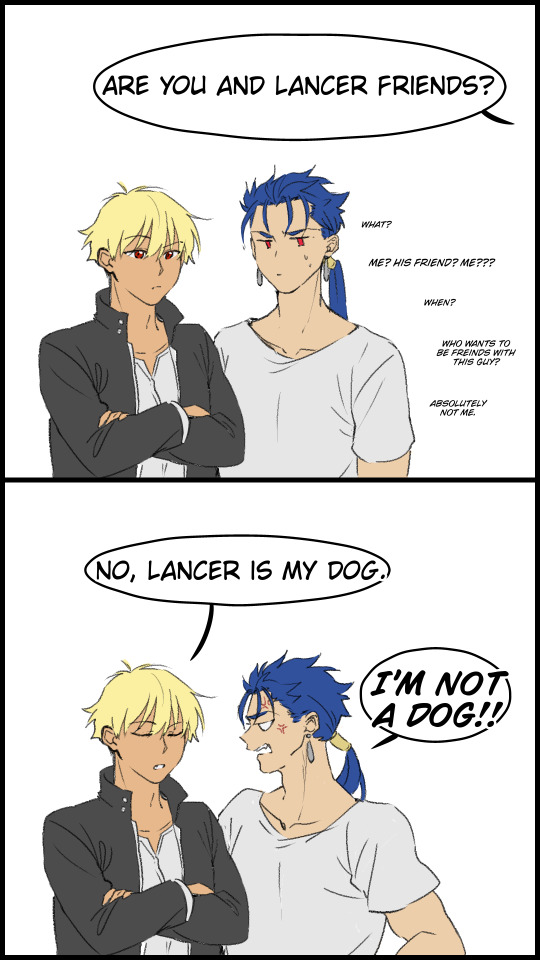
Hehe
#gilgamesh#cu chulainn#fate#i don't know how to tag stuff about fate#too many titles lol#gilcu#aaaaaaaaaaaaaaahhhhhhhhhhhhhhh#i don't know how to find stuff about them please tell me how plsplspls#the ship of all time. funny bastards. omg what even are they doing??? lololol#I'm saying this about the fic goldenblue summer but what?? two demigods from different myth doing unholy things in the goddamn church lolol#I generally try to keep to the canon character design but I saw dailycu's gil and i think it's the best gil color#golden skin for the golden haired king who wears a golden armor lol#oh. Gil should have said 'the mongrel is my dog.' or something. using Cu's class is too polite of him. i think
60 notes
·
View notes
Text
Scott Pilgrim Characters as Text Posts but they’re mostly of Stacey and Neil cause I’m obsessed with them :]
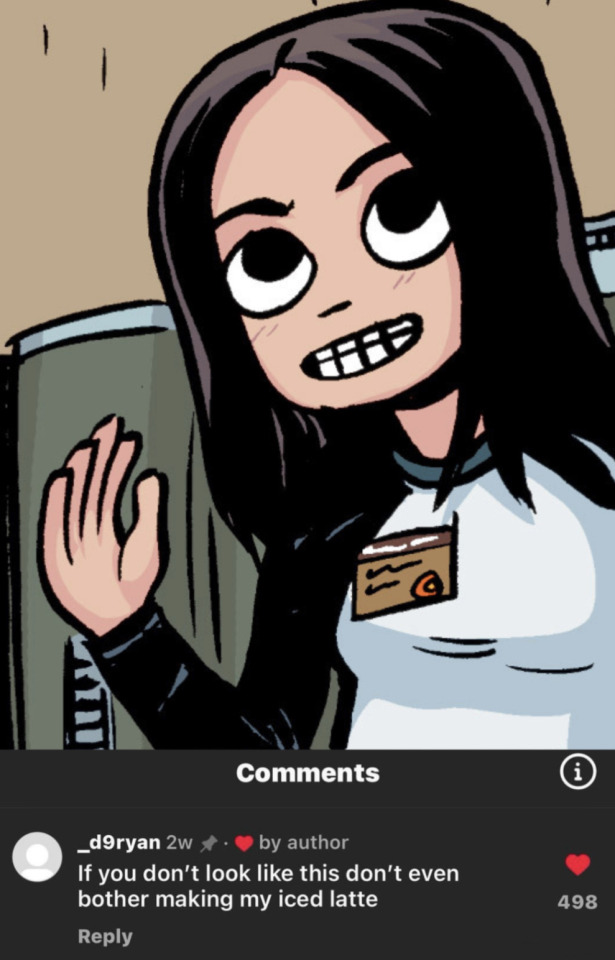

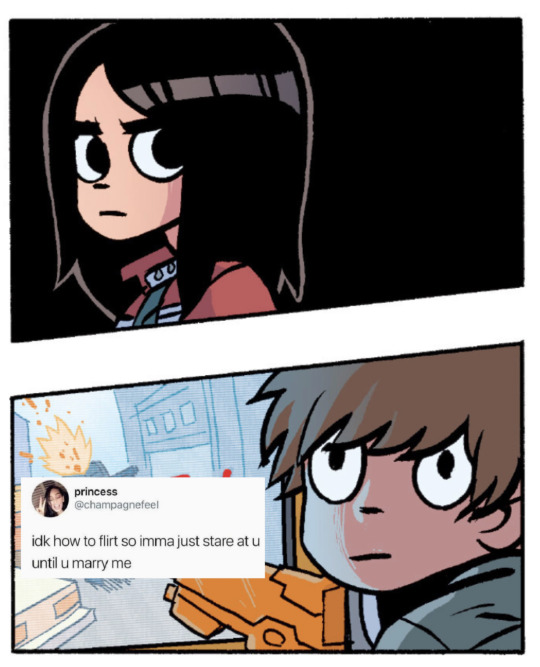
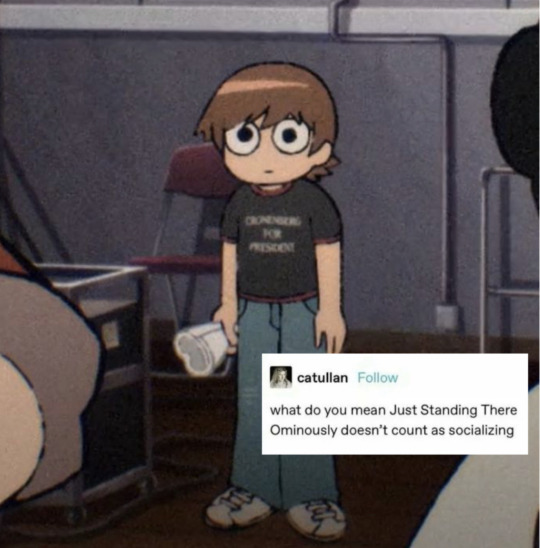
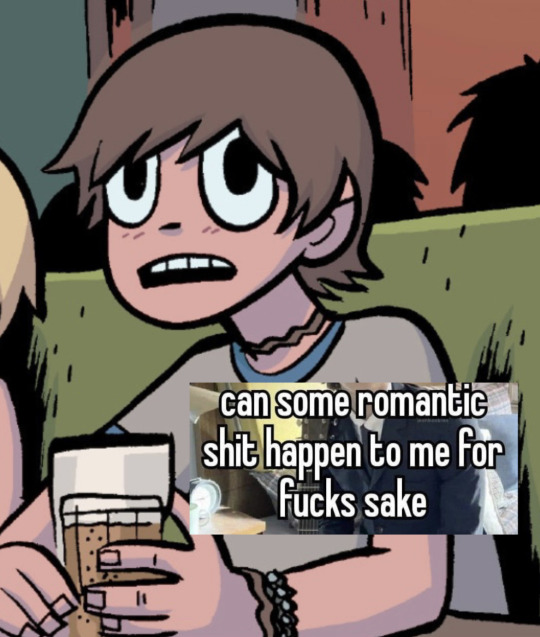
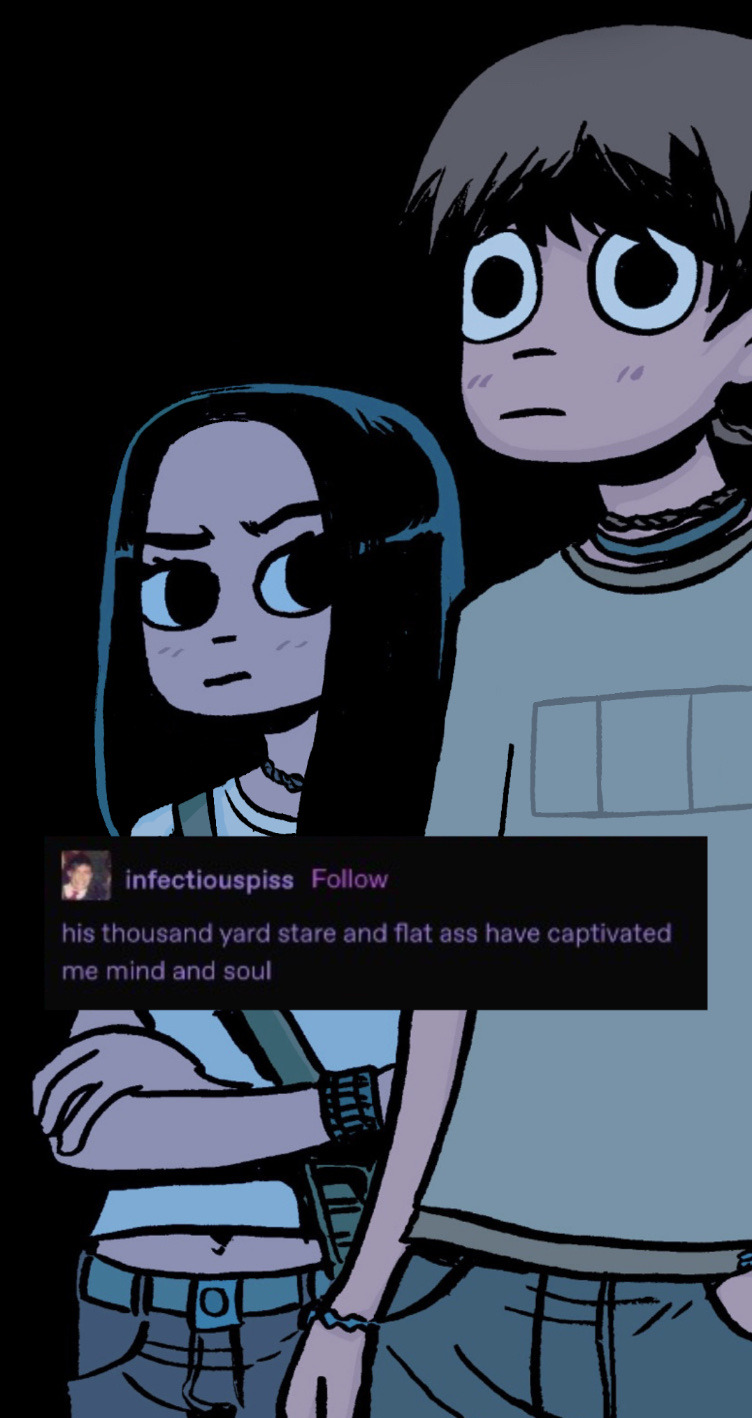
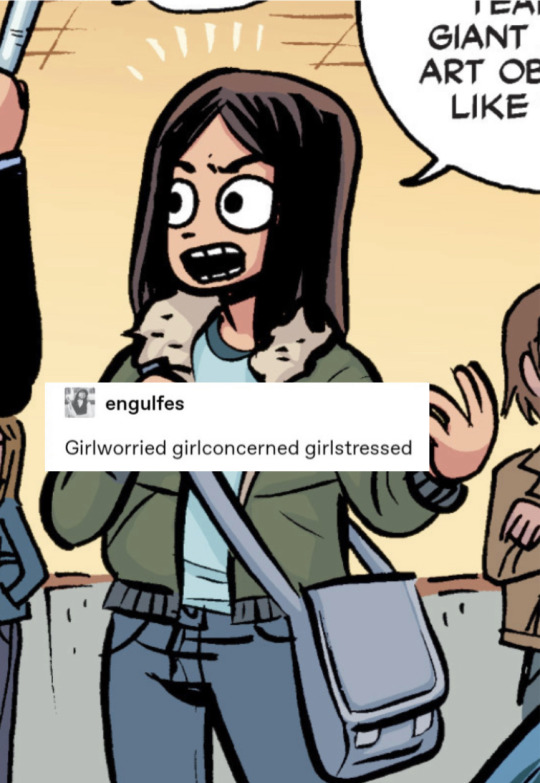
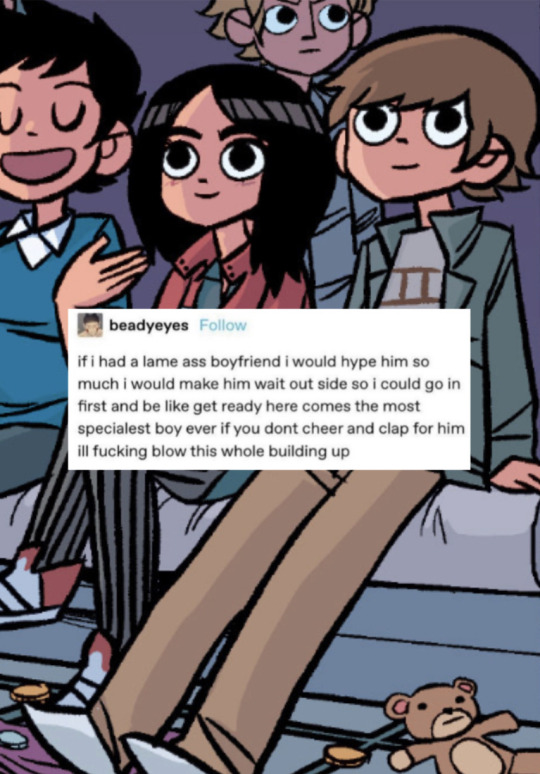
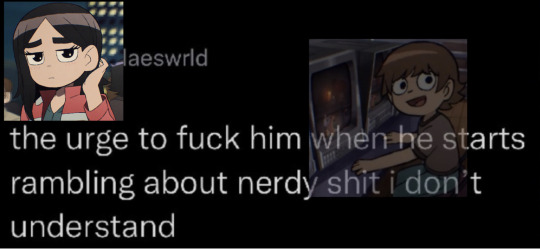
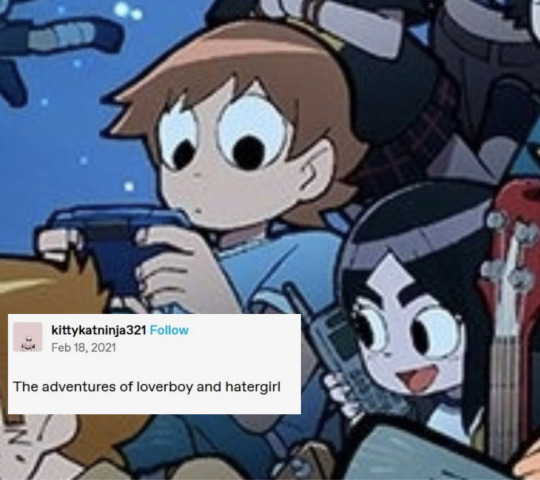
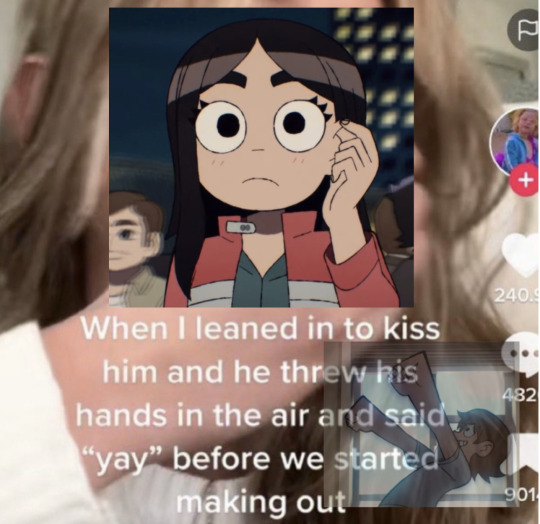
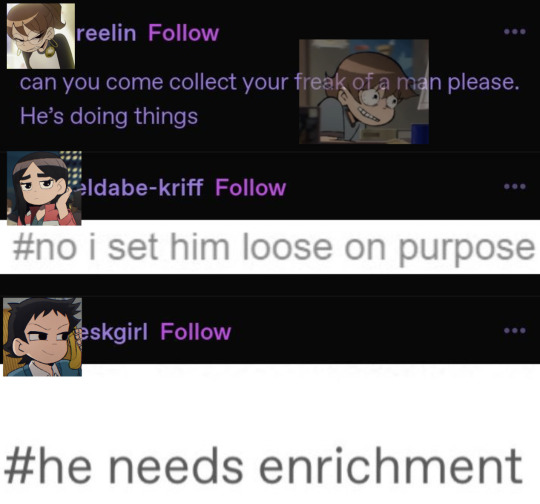
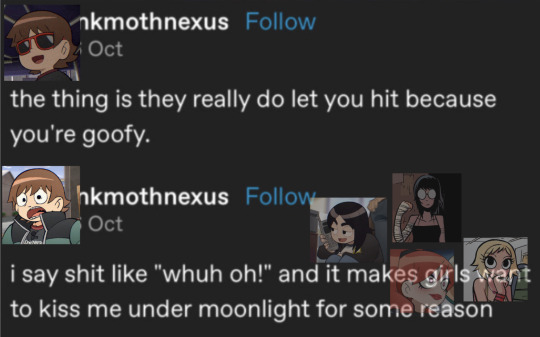
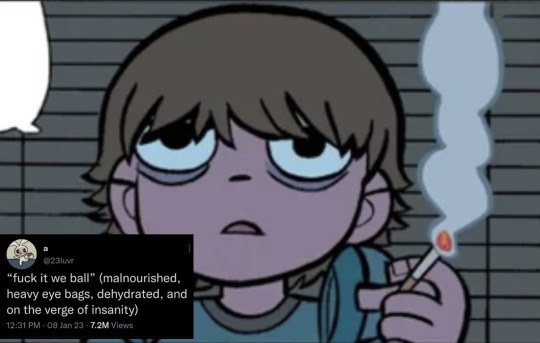
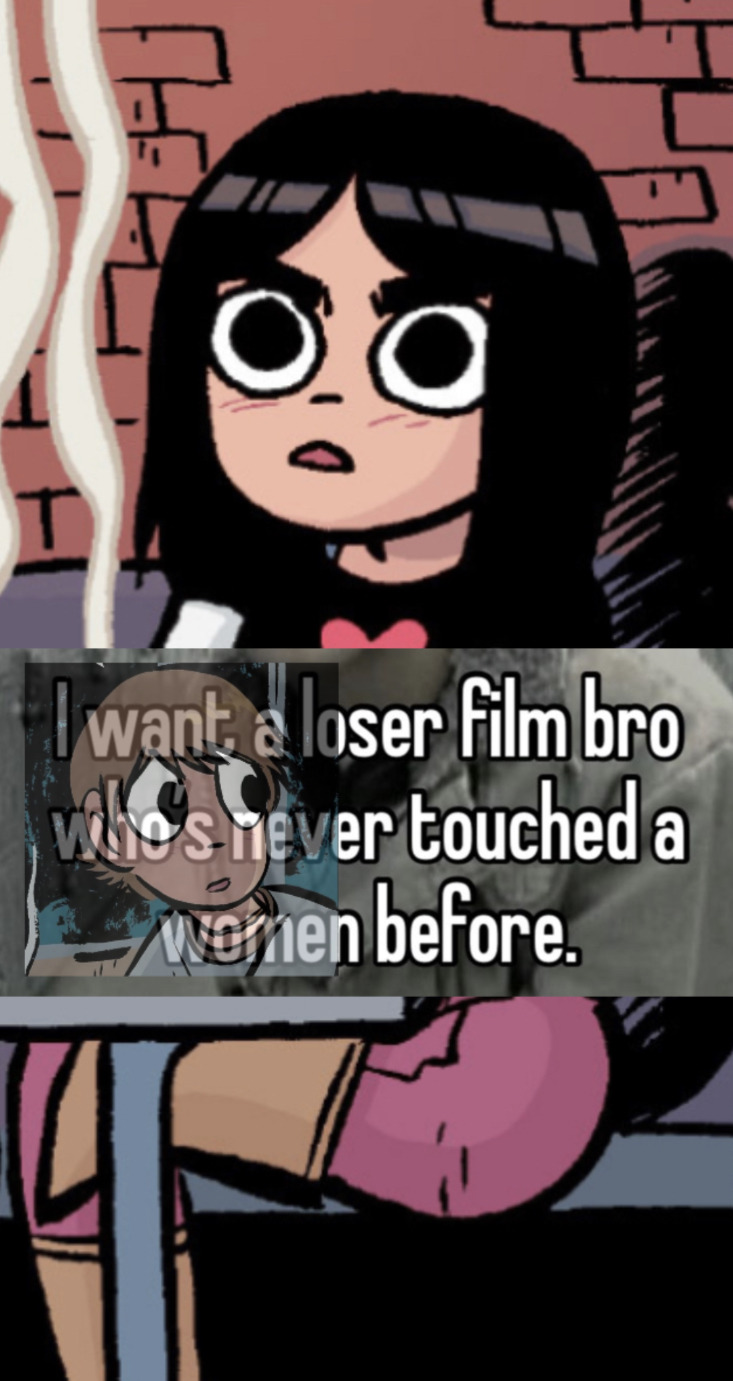
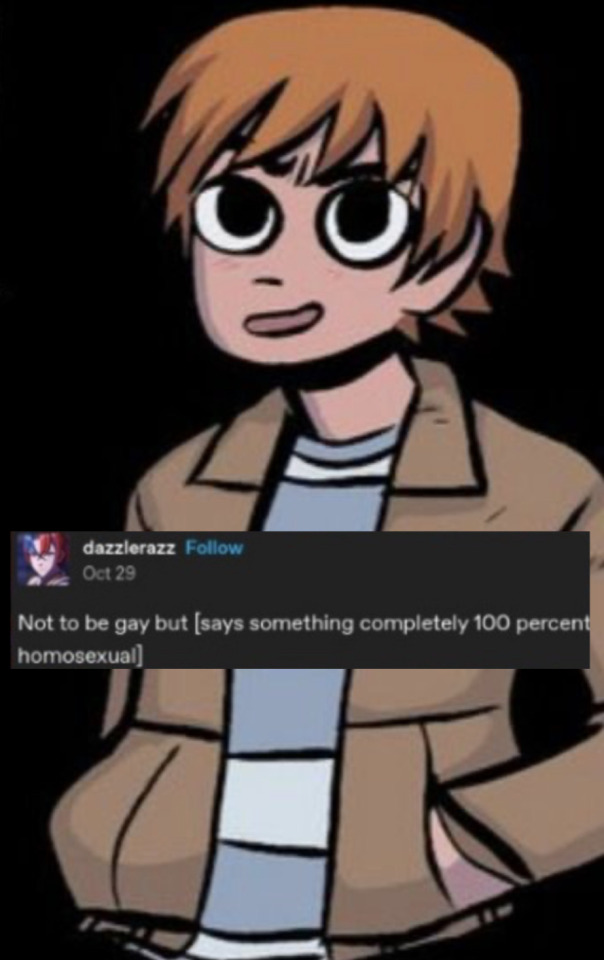
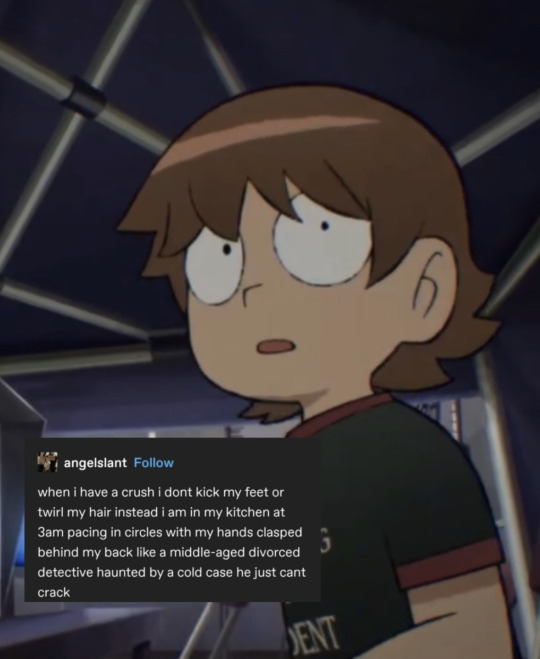
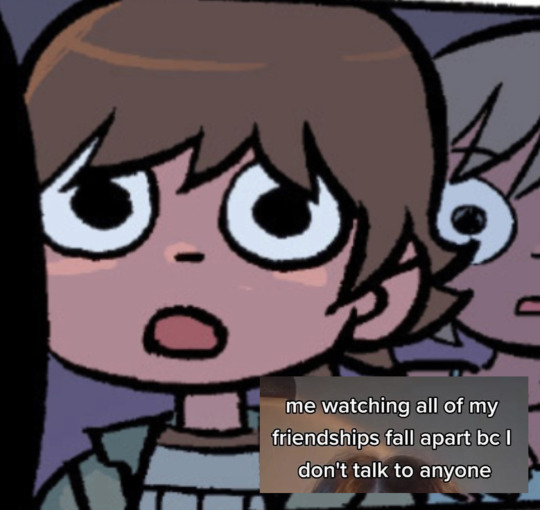
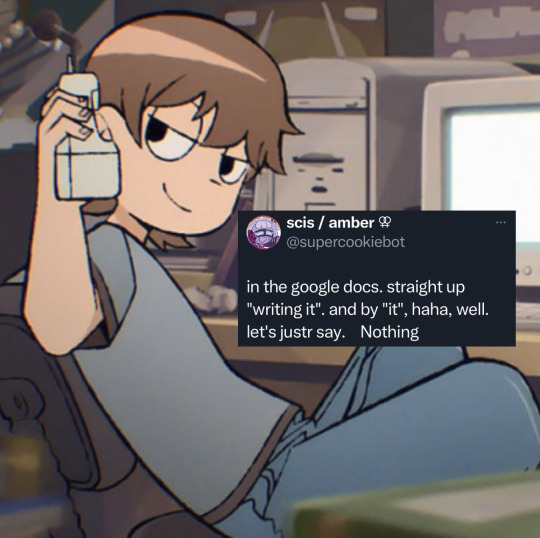
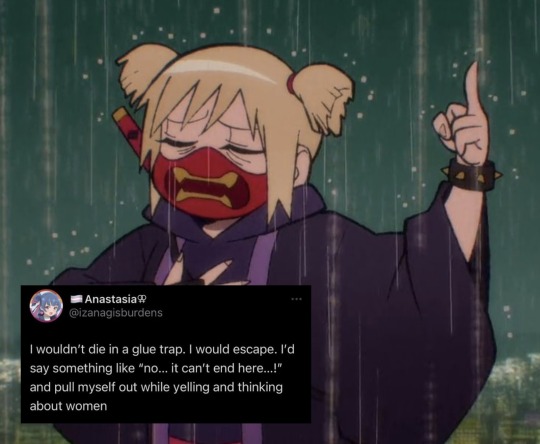
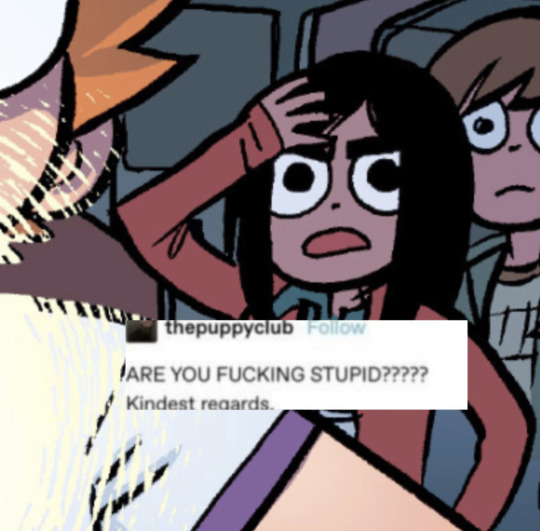
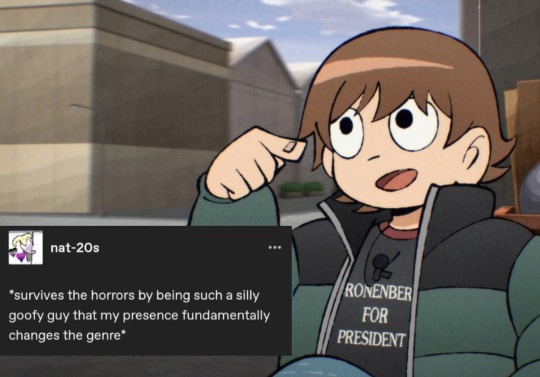
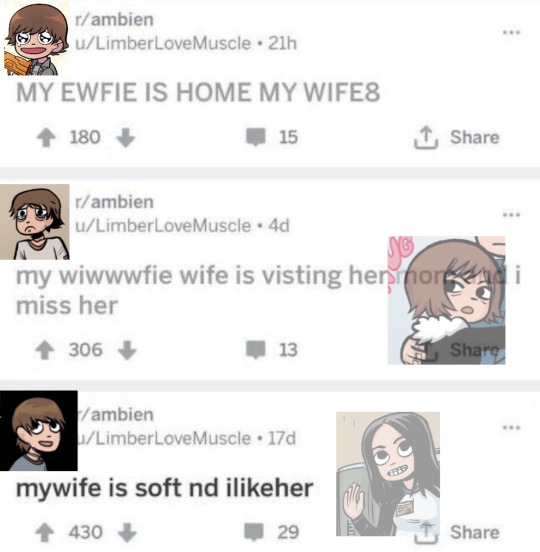
#some of these may have been done before but i cannot remember so apologies in advance i forgot#when i saw the first meme done with julie i knew i had to do it with stacey#last image you gotta read from bottom to top btw (i also added in stacey and scott and lawrence whos not here mom to make the image complet#)#I don’t personally ship Neil with Lynette envy or Lisa but those are the other three women I’ve seen him be shipped with#that make sense for that text post (julie would never and Kim is kissing Ramona)#we all know how garbage trash I am for nordegrim here so I don’t need to explain anything#stacey pilgrim is a little hater in my heart#scott may be her brother but she face palms whenever he does something incredibly stupid#scott pilgrim#scott pilgrim comic#scott pilgrim vs the world#scott pilgrim takes off#stacey pilgrim#young neil#neil nordegraf#julie powers#wallace wells#lynette guycott#envy adams#lisa miller#roxie richter#nordegrim#not gonna tag any of the other neil ships here cause it is mostly nordegrim#cw suggestive#emily shitposts
165 notes
·
View notes
Text
Glinda mentions to Elphaba how Fiyero can't stop thinking about that moment in Dillamond's class, or that he's having thoughts in general and how it worries her because it's not something she's used to from him (which is him thinking about actual things), in contrast to Elphaba, who doesn't seem all that bothered and, even more so interested in the manner when Fiyero brings up how he can't stop thinking about when they rescued the lion cub. I don't know about everyone else but for me, even with this scene probably being added for lighthearted value, I also see it as another piece in the puzzle cementing how Fiyero's and Glinda's actions will, eventually, either pull them closer or further away from Elphaba. I lowkey don't like it when people act surprised or confused as to why Glinda was spelled or get annoyed that Fiyero is in her place but I, personally, don't think she would have helped in that moment, specifically in the movie.
Prior to the train scene, Glinda is shown to, not only, be completely rude and spoiled (as shown with her literally fainting over not getting her way), when in class, she publicly points out Dillamond's inability to pronounce her name correctly even though it's an obvious struggle, parading in front of the class how easier it was for her other teachers to do it, then being dismissive during the rest of the lesson when learning the importance of history and why to learn from it (correct me if I'm wrong, as it has been a minute since I've seen the movie). All that already tells me that she doesn't really care for the animals' cause, let alone enough to follow Elphaba and Fiyero into the woods after stealing the lion cub and I think, subconsciously, Elphaba knew that. In fact, I can only see Glinda trying to sway them to leave the cub and how what their new professor wanted to teach probably wasn't all that bad (not saying that she would want the cub to be harmed, just that she would try to rationalize what's going as we've seen her do before). This is the same woman who, after learning that the Wizard was a fraud and responsible for the missing and harmed animals, still tried to justify his actions and berated Elphaba for not "acting accordingly" to the news, but yet we still think she should have been there to save the lion cub? That she would have helped those animals alongside Fiyero and Elphaba? I think it could allude to how Glinda could/will be used to help further push propaganda for the Wizard, especially given how it benefits her socially, as figures of propaganda often don't think too hard, or enough to critique the system around them not because they aren't smart enough too (for the most part), but more so because they understand how their world works and understand the consequences that follow when stepping out of line.
You don't have to like Fiyeraba or even find Fiyero interesting, but to purposely ignore what the movie is presenting you is such a cop-out. Fiyero enters the film being a sort of anti-establishment-like character, caring little if he gets kicked out of Shiz for breaking the rules, or just hardly caring in general (something Elphaba calls him out for), and so on. Why wouldn't he be down to rescue the lion? Even if it was to just feed his rebellious streak, he still would have gone, but when he and Elphaba meet, he's on a talking horse and they are conversing like lifelong friends. That might add another layer to the pair saving the lion. Even if he wasn't on the same level as Elphaba at that moment, the train scene shows that it had a profound impact on him that he couldn't shake. I think, had he been presented with the choice of joining Elphaba or staying, he would have gone, not only for her but also because he now knows that the Wizard is a fraud and most definitely wouldn't stand for what he [Oz] is doing. This is what sets him apart from Glinda which, isn't necessarily me hating on her but just stating facts. Glinda isn't/won't be willing to sacrifice her position and what it brings her, until it's too late (which is the tragedy of her character and her relationship with Elphaba), while Fiyero risks everything, even to some extent his own body (Scarecrow) and, in the end, gets to stand with Elphaba.
#i don't want to ship tag this bc im sure if either would necessarily fit but also bc i don't want to attract a certain audience#but idk we'll see how it goes#this was just my perspective giving an analysis to both the train scene and the lion cub scene#it's not an attempt to paint one character as better than the other (in a way bc glinda was acting wild ngl)#i also notice some in this fandom get touchy when you say glinda didn't change until the last minute (which is true)#but lost everything by that point and how tragic that is it's okay to admit that#while i do think fiyero could of had more character development in the movie i don't think he's completely pointless like some try to paint#him as and i hope act ii gives us more of him#dni if can't have a calm conversation#glinda upland#glinda the good witch#elphaba thropp#fiyero tigelaar#wicked spoilers#wicked#wicked 2024#even my friend who just got into the wicked fandom was like “yeah glinda wouldn't do shit for them animals”#so i know im not tripping
59 notes
·
View notes
Note
what do you think toshiro's version of laios would've been like if he was still with the group during the shapeshifter shenanigans
there have been a few speculations in the tag and among the fans and they are all very good SO i am going to take this opportunity to insert a bit of my shipping bias as i like in my interpretation LMAO agdsfgdfgv
i noted that in actuality shuro seems to have a very good grasp on laios' character??? this is most obvious in the manga later on but even seeing how he criticises laios in their fight... iirc nothing he says is actually untrue or wildly exaggerated, and while he does express frustration over something he feels like laios Should have control over (noticing his cues), he is also aware that laios isnt being malicious and that hes Just Like That. what i mean to say is that while i think his version of laios may seem more pushy and in-your-face, i dont think it will be overwhelmingly so. if its post-fight, i think the idea of laios (and marcille) being willing to do anything to get falin back made a big impression on him, as well as the idea that they need to eat and rest in order to succeed in their goals, so those aspects would be prominent in his version. he seems pretty observant, so i think for the most part the physical traits would line up, but i think there would be specific things that stand out to him that would appear strangely striking on his version of laios (like. idk something about his eye colour or the subtle contrast of his armour and chainmail. he seems to have a weird sense of aesthetics if extras are anything to go by lmao). if hed actually been paying attention all those times laios had gone on about what the hell ever, then it might be even MORE hard to tell apart his version since he would also have a good grasp on what laios should know. so either his version of laios is pretty difficult to pick out, OR despite the character being accurate his appearance is too. stylised lmao (exaggerated features or something) OR!! they just get him to pull out his monster gourmet guide thing and are able to tell from there. iirc everyone was surprised at its appearance so its possible toshiro had also never seen it before
IN MY IMAGINARY SHIPPING SCENARIO............ lets say that his laios isnt able to be picked out immediately and that the monster guide thing also doesnt immediately occur to anyone. what the real laios Specifically notices is how close this other laios keeps getting to shuro. and hes like. ??? why is he getting so close to him, theres no way i get that close to him??? but no one else seems to be picking up on it as weird, so hes having a small crisis like do i REALLY get that close to him???? and now that hes on the outside he notices shuro subtly leaning away and he feels both a wave of shame and..... protectiveness??? (JEALOUSY??????) and he immediately steps in and grabs him like Hey!!! cant you see hes uncomfortable???? weve been through this already!!! and like. ok i cant believe im doing this again but i need to separate this into different endings
a) the whump route: i dont think shuro ever envisioned Actually Telling laios about his frustrations outside of being basically cornered into it. has he ever spoken up against what was expected of him?? has he ever been confrontational???? i think part of what held him back from expressing his frustrations, along with the cultural norms, could be fear of what the reaction would be. if he had done the same in any other aspect of his life (his family, his inheritance), i think he would expect disappointment, disapproval, more proof that he doesnt add up to expectation. to be honest i dont think he Truly believes that laios is the type of person to react like this. but it was strong enough to prevent him from acting and i think would be projected onto his image of laios. maybe fake!laios says something dismissive like Well if it really bothered him hed say something right? what, he cant even stand up for himself? cmon, shuro, prove that you cant handle it just like everything else. and thats pretty much the fastest giveaway that it isnt really laios. of course this would be a HUGE tonal departure from what the actual episode/chapter was, so:
b) the dumbass route: both laioses break into fisticuffs, and, yes.... barking. and so they speedrun the entire encounter as the shapeshifters true form appears and, after laios points out that thinking too hard about others versions of you can tear apart groups and peace of mind, they pointedly do not speak of it again. they think about it though. a LOT
c) the normal route: both laioses argue normal like and the group ends up being able to tell them apart because the fake laios goes on a little too long about how theyre all here for falin and everyones like ok its not like he DOESNT love his sister but.......... the rest of the scenario probably goes like canon, though then i would want to see what everyone Else thought of shuro
#if it had been pre-fight i think shuro must have seen him as someone who wasnt serious enough or was too directionless#it would definitely have been easier to pick him out i think....#i realise that very little actual shipping made it into the scenario. but i hope you see the vision#anon#ask#laishuro tag#if shuro actually ended up having to judge them i cant tell you how accurate he would have been#i DO know that compared to laios he would have been watching their social interactions more carefully#maybe he notices certain habits. i dont know if he would get all of them right though. he definitely gets laios right#long post#huge fucking post even. im so sorry. i hope this answered your question#this is actually shorter than it originally was i took off a paragraph#and.. shorter again because i just revised the final route LMAO#its kinda important that laios is the one that judges so i fixed it. originally i was like well what if shuro judged#which u can kind of tell from the tags above lmao#ok i give up i cant edit this anymore here u go <3
151 notes
·
View notes
Text
some of the things people say about Damian on here are fucking disgusting
I don't care if he's fictional, I would never say these things about a child
#mutual posted the 'damian wayne has a heart' tag from a03 and honestly I hate everyone who has posted under it#it was presented as an au or something they added to the character#as if it hasn't been there all along in canon#like so many people on here treat damian like a heartless irredeemable feral monster who needs to be taught to be human#by his white family members#like how do you not see how disgusting that is to say that about a child#and that's not even touching shipping him with full-grown adults/people related to him everyone knows y'all are troglodytes#damian wayne#batfam#batfamily#dc robin#robin#or tags with the shit like 'damian consntantly trying to murder tim' no the fuck he isn't#not to mention but honestly I have seen the crossover between people who are really shitty to damian and shitty about irl kids#but who would be surprised?
168 notes
·
View notes